
8 Tips to Write a Thesis in 30 Days (Bonus Tip Included)
Every student wants to know how to write a thesis in a month . Before sharing the tips that I’ve used in my writing journey, we first need to ask: is it possible to write a thesis in one month, and actually finish it? The answer to this question is yes! You absolutely can write a thesis in 30 days. And you can write your thesis, from start to finish, without the emotional distress that often comes with such a monumental task. And, before you ask, no you’re not going to pay anybody to write a thesis for you. You’re going to write your thesis by yourself.
I’ve written two Masters’ theses, a PhD dissertation and a draft of a book. Here are the 8 tips that have helped me write my thesis as quickly as possible and get to the other side.
3.1 Use Grammarly: An Online Writing Assistant
My 8 tips on how to write a thesis or dissertation in a month.
Before we start, let me say that no one is born knowing how to write a thesis. My professors were not born knowing how to write a thesis and I wasn’t born knowing how to write a thesis either.
I learned how to write a thesis. It was not easy, and I struggled a lot in writing my first thesis. That’s until I discovered what I needed to do to push through and finish writing it.
I then used those lessons and applied them to my second thesis and every writing assignments since then. Writing became fun.
In fact, I was having so much fun writing my second thesis that I took on extra writing assignments. Hence the birth of this blog.
1. Adjust Your Expectations
If you want to finish writing your thesis in a month, the first thing you need to recognize is that you don’t need to break new grounds in your thesis for your thesis to be acceptable.
If for some reason you think you need to break new grounds, then you need to quickly adjust your expectations. The point of a thesis is to demonstrate mastery of the literature and show that you’re able to competently synthesize and present those works persuasively.
That’s all you need to do.
If you’re aiming for more, then consider these two points:
- You don’t have the advanced training or the experience yet to “contribute” to the field. It’s certainly not impossible, but that’s not what’s expected of you in your M.A thesis (and even in your PhD thesis). In fact, if you can just slightly “advance” the research, that’s considered a great accomplishment!
- You need much longer than 30 days or 3 months or even 3 years to come up with something new. Why? Because you need to read literally everything on your subject. And that’s what you’re expected to do when you’ve already finished writing your thesis, and decided to pursue an academic career.
For these two reasons, I think it’s best to view your thesis as something that reflects what you’ve been trained to do, which is to write a good thesis using the skills you already have. You are enough and you probably already have what it takes to write your thesis. So don’t be too hard on yourself. Think of this: Just like you can’t run a marathon if you’ve been training for a 5k, you also can’t “contribute to the field” when you’re still in the process of being trained on how to write a thesis. Most probably, this is your first time writing a masters degree thesis, so take it easy. (More on writing a PhD dissertation below).
So, adjust your expectations accordingly.
Now, if you are trying to write your PhD thesis in a month, let me first say that it’s almost impossible. But if you have certain circumstances (say like a serious illness), then talk to your advisor about it and see what he/she suggests.
2. Don’t Be a Perfectionist
A professor once told me, if you want to write a perfect thesis, “you will never finish writing.” And he was right. I can’t begin to tell you just how much time I wasted trying to write a flawless thesis (AHHH!). In the end, it was not worth it. I ended up procrastinating and wasting time. I wish I could have that time back. Please, don’t make the same mistake I made.
After that emotionally draining experience, I changed my approach. I strove to write something good (and not perfect). I then got feedback on my ideas from my professors and went back and made them better. Eventually, they were, in my eyes, perfect. I was happy.
If you still think you need to be a perfectionist, consider this: there’s always more you can say about your topic. There are more examples you can discuss, more evidence to support your arguments with, and there is an infinite number of ways to organize your ideas, paragraphs and chapters to eventually turn your thesis into a “masterpiece.” You literally can go on forever writing and re-writing your thesis.
If you’re tight on time and you want to finish writing your thesis in 30 days, then do yourself a favor and focus on being done . Write something that’s good enough and move on knowing that you will get back to it later.
So stop fixing things day in and day out. The goal is to make linear progress every single day until you’re done.
Remember, a mediocre finished thesis is better than a perfect unfinished one.
3. Take the 80/20 Rule Seriously
Each writing assignment will take you as much time as you’re willing to give it.
So if you give yourself 10 hours to write what usually takes 2 hours, then you will spend 10 hours working on it.
And the opposite is true.
If you have an assignment that usually takes 10 hours to finish, and I give you 2 hours to work on it, you will probably finish it in 2 hours.
On this basis, if you want to write your thesis in 30 days, you have to decide that 30 days is all you have to finish writing it. Be firm about this deadline, and work with the aim of finishing.
To help speed up the writing process, you can benefit from using a powerful writing assistant like Grammarly . ( Disclosure : these are affiliate links which means I will receive a commission if you make a purchase using my referral links.) Please know that I only talk about services that I believe in and can stand behind. And this is one of those amazing products that can be of tremendous benefit to you if you are looking to get over writer’s block and avoid unnecessary slowdowns .
Okay, so quickly: what should you expect from Grammarly?
Grammarly can help save you a lot of time – especially when you are stuck looking for the right word, or the right way to phrase a sentence. Grammarly gives you a list of context-specific vocabulary suggestions/enhancements/corrections and allows you to make an informed decision about what’s best in your specific writing context. This makes your writing flow better and allow you to move forward at a faster rate.
Here are testimonies by students about how Grammarly has helped them with writing their thesis.

Just downloaded Grammarly for the first time and it has transformed my essays. I sound so smart! #Grammarly #Student — Lucy Jade ANutr (@lucyj_nutrition) March 2, 2019
#WhiteSmoke online editor combined with #Grammarly Chome extension..genius… Why didn't I discovered that earlier #Writing #Thesis #PhD — Quirina de Ruiter (@QuirinaDeRuiter) June 28, 2016
Here are some statistics on how Grammarly has helped students and writers get better results.

With Grammarly, you don’t have to worry about proofreading. It will do that for you. You don’t have to worry about manually checking for plagiarism , style, punctuation, and even wordiness. Grammarly can help you do all of that and will also offer explanations for the reasoning behind each correction.

You can also use Grammarly for better and more professional sounding emails – especially when you want to email your advisor and your committee. You can also use Grammarly across pretty much all of your social media platforms including twitter, facebook, linkedin and more.

In order to get access to all the tools that will help you write your thesis efficiently, I recommend their premium plan . The total cost comes out to 2 – 3 cups of cappuccinos… it’s worth it.
4. Don’t Reinvent the Wheel
Here’s a dose of realism.
As original as you would like to be in your thesis, someone has already written on your topic… and that’s a great thing!
Someone has read the same sources, summarized them and put them in their literature review. You can save yourself a whole lot of time by reading literature reviews. There, you will see exactly how they used those sources and how they might fit into your work. Consult the original sources briefly, but as much as necessary to get the main ideas out of them, and move on.
A literature review shouldn’t take you more than a week to complete if you plan to finish writing in 30 days, and that’s totally doable.
5. Complete a Quick First Draft
The fastest way to finish writing is to write quickly…duh.
What I mean by that is if you’re stuck and you can’t quite round up the paragraph or idea you’re working on, don’t dwell on it. Move on to other topics within your thesis and write them out.
The most helpful tip that I can share with you is to force yourself to write a quick high school draft (first draft) of the entire thesis. Go all the way through until you have a completed first draft of your thesis in your hands.
This is going to be tremendously helpful for your progress because if you can see the conclusion of your thesis, you will a have better sense of which parts of your thesis need work, and which parts need to be completely cut out.
In fact, that’s, in my opinion, the only way to know what your thesis really needs. I say this because imagine if you had spent tens of hours fixing a paragraph only to discover later on (or be told by your advisor) that you really don’t need it.
Let me tell you, it freakin sucks!
6. Journal Articles Are Your Best Friend
Journal articles are usually less than 25 pages in length and sometimes even less than 15 pages long. The best part about them: they’re succinct. You can pretty much read the abstract and you’ll know exactly what the main argument is and the strategy of the paper.
All you need to do then is to look for the evidence in the paper itself. It shouldn’t take you anything more than 3 hours to get this information out of the paper. And when you get good at this, it will take you even less than 3 hours.
Moreover, journal articles are a great way to help position your thesis within the literature on the topic, and you will have a much clearer destination when you do so.
See my post on how to read faster .
7. Write (Your Thesis) Everywhere
If you’ve been following my blog, then you know that I champion using free time effectively.
Plan to read or write everywhere : whether you’re waiting on a friend, waiting for the bus, or eating lunch. It will help you address what I’ve called elsewhere as the “familiarity deficit.” Read that post here . Don’t underestimate the value of that time. It will give you a much needed head-start when it’s time to sit down and work on the relevant chapter within your thesis.
The key to finishing your thesis in 30 days is to keep writing even when you don’t feel you’ve got much to say. It will come to you, just don’t give up too soon.
If you experience some mental roadblocks and you’re dealing with procrastination, then give this article a quick read to help you overcome procrastination and take action.
8. Bonus Tip – Join Online Writing Communities
Yes. Join online writing communities. They’re free and you will get a whole lot of support from people who are going through the same thing. Try Phinished . I’ve used it when I wrote my first thesis and it helped me a bunch.
I need to caution that it is easy to spend a lot of time on Phinished reading what others have to say. You might find yourself reading page after page about the challenges others are going through: including what they’re doing to move through the process, and how far they are in their thesis writing.
If you want to finish, then use it with the intention to finish and not to waste more time or procrastinate.
Hope this will help you finish your thesis in 30 days!
Privacy Overview
8 Rules to write a PhD Thesis
Rule 4: make a phd timetable.
A PhD thesis can not be written in one week. Get this through your head. It is hard, maybe even the hardest thing you have to do during your PhD. It is going to be a painful task for most of you (it was for me). So schedule it in a proper time-wise manner. Do not wait until it’s just two weeks before the deadline to start writing. Here is a proposal: make a document with your PhD plan . Write down in that document the important things that need to be done in the last six months of your PhD, preferably in some chronological order. 3 Examples of things to write can be submission of papers, finishing data analyses or other leftover work, writing the thesis, preparing for the defence, sending some important emails, etc. Allocate at least two months of your time for the writing of the thesis . That’s a minimum proposed time frame and it might be far from ideal for you. Time equals money as they say, and that’s definitively the case for the PhD. So you might not want to spend too much of your time in thesis writing. On the other hand, you surely don’t want to underestimate the time that is required for such a colossal task. Therefore, you need to make a well-balanced estimate and plan your thesis writing accordingly. How can then someone derive such an estimate ?
For starters, you need to understand that the exact amount of time that is necessary to finish the thesis writing is hard to predict. The reason for this is that during such a large time period, your life is going to be influenced by a lot of factors. Some of these factors are uncontrollable and there is no way to prepare for them (the phenomenon also simply known as “ life happens ”). Some other factors are directly related to the practical task at hand and can thus be more easily predicted and regulated to your advantage. Using this knowledge, you can make a rough calculation of how much time it will take to write your PhD thesis. I personally think three factors are of significant importance to derive such an estimate. First, the format of the thesis , i.e. a paper-based thesis or a monograph, the latter of which will surely require more time to finish. Second, your personal writing speed , measured in the amount of chapters that you will be able to write on average in a specified time period (usually a week). Third, the number of chapters you need to write. Choosing the format of the thesis should be fairly obvious, based on common practices in your research field, the regulations of your academic institution and the existence or not of published PhD work (papers). Moreover, you should already have a pretty good estimate on the amount of total chapters, based on the modular way of constructing your PhD story as was explained in Rule 3 . Then all that is left, is for you to make an educated guess of your writing speed. The combination of the aforementioned three factors will then help you make a realistic estimation of how long the PhD thesis writing will take.
Let me share with you my personal experience on this matter. My thesis was paper-based. Following the rules in the section During writing , I was writing one to two thesis chapters per week. These were chapter drafts, so definitely not polished material. Therefore, my minimum writing speed was around one chapter per week . Continuing, I had a total of eight chapters to write + the abstract (derived from my initial story structure), which let’s say was equivalent to approximately nine chapters. Worst case scenario, I write one chapter per week, so a total of nine weeks are required. Best case scenario, I write two chapters per week, so a total of five weeks are required (rounding it up). Chapter size plays a huge role as you can probably guess. The proposed estimate of two months time is somewhere between five and nine weeks and closer to the second (the maximum of the two). So, eight weeks, equal to two months, sounded like a good deadline for my writing project. In the end, I finished the thesis writing in seven weeks, which was one week before the deadline. That included also reviewing the edits and comments from my supervisor and several rewrites. The important thing to remember here is that the calculation of your thesis time frame is going to be a personal rough estimate . Therefore, using an average writing speed of one chapter per week without further thought is justifiable (see Rule 7 on how to have more control over this). To summarize, my advice is to 1) calculate the number of chapters you are going to write 2) directly translate that number to weeks and 3) round it up to months. 4
Responsibly follow the time schedule you set up for yourself and be aware to not procrastinate on your thesis writing. This has also been stated more empirically as the notion that “ work expands to fill the time available for its completion ” (Parkinson’s Law). Procrastination can lead to unpleasant and stressful days before the thesis submission, that anyone would gladly dispense with. I have seen people doing rewrites, last minute additions, or otherwise work that could have been done a week or so ago, if properly scheduled. I have heard of people literally running to submit a printed copy in their respective department one hour before the deadline. Doesn’t sound too good to me. It’s a million times better to be prepared and follow your time plan religiously . Try to schedule your thesis writing in an anticipatory manner. This will happen when unfortunate scenarios that you can personally deal with, are managed to a satisfying degree. See also related discussion in the Epilogue .
Make a PhD timetable and allocate a realistic time frame for your thesis writing.
Of course you can make such a plan document from the start of your PhD. I just want to stress here the importance of including in this document what needs to be done during the last stages of your PhD. ↩︎
Remember to round up the resulting number to months! A basic arithmetic example is appropriate here. If you have a total of \(11\) chapters, the time required to write them down would be calculated as follows: \(\frac{11 \text{ chapters }}{1 \text{ chapter/week }}=11 \text{ weeks } \approx 12 \text{ weeks }\) (closest multiple of \(4\) ), which is equal to \(3\) months, assuming that \(1\) month is equal to \(4\) weeks. ↩︎
- International edition
- Australia edition
- Europe edition

Finishing your PhD thesis: 15 top tips from those in the know
Trying to complete a PhD thesis in time for the October deadline? We share some advice on getting over that final hurdle
- The key to a successful PhD thesis? Write in your own voice
Many PhD students are now in the final throes of writing their thesis. Turning years of research into a single, coherent piece of work can be tough, so we asked for tips from supervisors and recent PhD graduates. We were inundated with tweets and emails – and @AcademiaObscura helpfully created a Storify of the tweets. Below is a selection of the best tips.
1) Make sure you meet the PhD requirements for your institution “PhD students and their supervisors often presume things without checking. One supervisor told his student that a PhD was about 300 pages long so he wrote 300 pages. Unfortunately the supervisor had meant double-spaced, and the student had written single-spaced. Getting rid of 40,000 extra words with two weeks to go is not recommended.” ( Hannah Farrimond, lecturer in medical sociology, Exeter University)
2) Keep perspective “Everyone wants their thesis to be amazing, their magnum opus. But your most important work will come later. Think of your PhD as an apprenticeship. Your peers are unlikely to read your thesis and judge you on it. They are more likely to read any papers (articles, chapters, books) that result from it.” ( Dean D’Souza, PhD in cognitive neuroscience, Birkbeck, University of London)
3) Write the introduction last “Writing the introduction and conclusion together will help to tie up the thesis together, so save it for the end.” ( Ashish Jaiswal, PhD in business education, University of Oxford)
4) Use apps “ Trello is a project management tool (available as a smartphone app) which allows you to create ‘boards’ on which to pin all of your outstanding tasks, deadlines, and ideas. It allows you to make checklists too so you know that all of your important stuff is listed and to-hand, meaning you can focus on one thing at a time. It’s satisfying to move notes into the ‘done’ column too.” ( Lucy Irving, PhD in psychology, Middlesex University)
5) Address the unanswered questions “There will always be unanswered questions – don’t try to ignore or, even worse, obfuscate them. On the contrary, actively draw attention to them; identify them in your conclusion as areas for further investigation. Your PhD viva will go badly if you’ve attempted to disregard or evade the unresolved issues that your thesis has inevitably opened up.” ( Michael Perfect, PhD in English literature, University of Cambridge)
6) Buy your own laser printer “A basic monochrome laser printer that can print duplex (two-sided) can be bought online for less than £100, with off-brand replacement toners available for about £30 a pop. Repeatedly reprinting and editing draft thesis chapters has two very helpful functions. Firstly, it takes your work off the screen and onto paper, which is usually easier to proof. Secondly, it gives you a legitimate excuse to get away from your desk.” ( James Brown, PhD in architectural education, Queen’s University Belfast)
7) Checking is important “On days when your brain is too tired to write, check quotations, bibliography etc so you’re still making progress.” ( Julia Wright, professor of English at Dalhousie University, Canada)
8) Get feedback on the whole thesis “We often get feedback on individual chapters but plan to get feedback from your supervisor on the PhD as a whole to make sure it all hangs together nicely.” ( Mel Rohse, PhD in peace studies, University of Bradford)
9) Make sure you know when it will end “Sometimes supervisors use optimistic words such as ‘You are nearly there!’ Ask them to be specific. Are you three months away, or do you have six months’ worth of work? Or is it just a month’s load?” ( Rifat Mahbub, PhD in women’s studies, University of York)
10) Prepare for the viva “Don’t just focus on the thesis – the viva is very important too and examiners’ opinions can change following a successful viva. Remember that you are the expert in your specific field, not the examiners, and ask your supervisor to arrange a mock viva if practically possible.” ( Christine Jones , head of school of Welsh and bilingual studies, University of Wales Trinity St David)
11) Develop your own style “Take into account everything your supervisor has said, attend to their suggestions about revisions to your work but also be true to your own style of writing. What I found constructive was paying attention to the work of novelists I enjoy reading. It may seem that their style has nothing to do with your own field of research, but this does not matter. You can still absorb something of how they write and what makes it effective, compelling and believable.” ( Sarah Skyrme, PhD in sociology, Newcastle University)
12) Remember that more is not always better “A PhD thesis is not a race to the highest page count; don’t waste time padding.” ( Francis Woodhouse, PhD in mathematical biology, University of Cambridge)
13) Get a buddy “Find a colleague, your partner, a friend who is willing to support you. Share with them your milestones and goals, and agree to be accountable to them. This doesn’t mean they get to hassle or nag you, it just means someone else knows what you’re up to, and can help to check if your planning is realistic and achievable.” ( Cassandra Steer, PhD in criminology, University of Amsterdam)
14) Don’t pursue perfectionism “Remember that a PhD doesn’t have to be a masterpiece. Nothing more self-crippling than perfectionism.” ( Nathan Waddell, lecturer in modernist literature, Nottingham University )
15) Look after yourself “Go outside. Work outside if you can. Fresh air, trees and sunshine do wonders for what’s left of your sanity.” ( Helen Coverdale, PhD in law, LSE)
Do you have any tips to add? Share your advice in the comments below.
Join the higher education network for more comment, analysis and job opportunities , direct to your inbox. Follow us on Twitter @gdnhighered.
- Universities
- Early career researchers
- Impact of research
- Higher education
Comments (…)
Most viewed.

Tips for writing a PhD dissertation: FAQs answered
From how to choose a topic to writing the abstract and managing work-life balance through the years it takes to complete a doctorate, here we collect expert advice to get you through the PhD writing process
Campus team
Additional links.

You may also like

Popular resources
.css-1txxx8u{overflow:hidden;max-height:81px;text-indent:0px;} Emotions and learning: what role do emotions play in how and why students learn?
A diy guide to starting your own journal, universities, ai and the common good, artificial intelligence and academic integrity: striking a balance, create an onboarding programme for neurodivergent students.
Embarking on a PhD is “probably the most challenging task that a young scholar attempts to do”, write Mark Stephan Felix and Ian Smith in their practical guide to dissertation and thesis writing. After years of reading and research to answer a specific question or proposition, the candidate will submit about 80,000 words that explain their methods and results and demonstrate their unique contribution to knowledge. Here are the answers to frequently asked questions about writing a doctoral thesis or dissertation.
What’s the difference between a dissertation and a thesis?
Whatever the genre of the doctorate, a PhD must offer an original contribution to knowledge. The terms “dissertation” and “thesis” both refer to the long-form piece of work produced at the end of a research project and are often used interchangeably. Which one is used might depend on the country, discipline or university. In the UK, “thesis” is generally used for the work done for a PhD, while a “dissertation” is written for a master’s degree. The US did the same until the 1960s, says Oxbridge Essays, when the convention switched, and references appeared to a “master’s thesis” and “doctoral dissertation”. To complicate matters further, undergraduate long essays are also sometimes referred to as a thesis or dissertation.
The Oxford English Dictionary defines “thesis” as “a dissertation, especially by a candidate for a degree” and “dissertation” as “a detailed discourse on a subject, especially one submitted in partial fulfilment of the requirements of a degree or diploma”.
- Ten platinum rules for PhD supervisors
- Fostering freedom in PhD students: how supervisors can shape accessible paths for doctoral research
- Lessons from students on effective research supervision
The title “doctor of philosophy”, incidentally, comes from the degree’s origins, write Dr Felix, an associate professor at Mahidol University in Thailand, and Dr Smith, retired associate professor of education at the University of Sydney , whose co-authored guide focuses on the social sciences. The PhD was first awarded in the 19th century by the philosophy departments of German universities, which at that time taught science, social science and liberal arts.
How long should a PhD thesis be?
A PhD thesis (or dissertation) is typically 60,000 to 120,000 words ( 100 to 300 pages in length ) organised into chapters, divisions and subdivisions (with roughly 10,000 words per chapter) – from introduction (with clear aims and objectives) to conclusion.
The structure of a dissertation will vary depending on discipline (humanities, social sciences and STEM all have their own conventions), location and institution. Examples and guides to structure proliferate online. The University of Salford , for example, lists: title page, declaration, acknowledgements, abstract, table of contents, lists of figures, tables and abbreviations (where needed), chapters, appendices and references.
A scientific-style thesis will likely need: introduction, literature review, materials and methods, results, discussion, bibliography and references.
As well as checking the overall criteria and expectations of your institution for your research, consult your school handbook for the required length and format (font, layout conventions and so on) for your dissertation.
A PhD takes three to four years to complete; this might extend to six to eight years for a part-time doctorate.
What are the steps for completing a PhD?
Before you get started in earnest , you’ll likely have found a potential supervisor, who will guide your PhD journey, and done a research proposal (which outlines what you plan to research and how) as part of your application, as well as a literature review of existing scholarship in the field, which may form part of your final submission.
In the UK, PhD candidates undertake original research and write the results in a thesis or dissertation, says author and vlogger Simon Clark , who posted videos to YouTube throughout his own PhD journey . Then they submit the thesis in hard copy and attend the viva voce (which is Latin for “living voice” and is also called an oral defence or doctoral defence) to convince the examiners that their work is original, understood and all their own. Afterwards, if necessary, they make changes and resubmit. If the changes are approved, the degree is awarded.
The steps are similar in Australia , although candidates are mostly assessed on their thesis only; some universities may include taught courses, and some use a viva voce. A PhD in Australia usually takes three years full time.
In the US, the PhD process begins with taught classes (similar to a taught master’s) and a comprehensive exam (called a “field exam” or “dissertation qualifying exam”) before the candidate embarks on their original research. The whole journey takes four to six years.
A PhD candidate will need three skills and attitudes to get through their doctoral studies, says Tara Brabazon , professor of cultural studies at Flinders University in Australia who has written extensively about the PhD journey :
- master the academic foundational skills (research, writing, ability to navigate different modalities)
- time-management skills and the ability to focus on reading and writing
- determined motivation to do a PhD.

How do I choose the topic for my PhD dissertation or thesis?
It’s important to find a topic that will sustain your interest for the years it will take to complete a PhD. “Finding a sustainable topic is the most important thing you [as a PhD student] would do,” says Dr Brabazon in a video for Times Higher Education . “Write down on a big piece of paper all the topics, all the ideas, all the questions that really interest you, and start to cross out all the ones that might just be a passing interest.” Also, she says, impose the “Who cares? Who gives a damn?” question to decide if the topic will be useful in a future academic career.
The availability of funding and scholarships is also often an important factor in this decision, says veteran PhD supervisor Richard Godwin, from Harper Adams University .
Define a gap in knowledge – and one that can be questioned, explored, researched and written about in the time available to you, says Gina Wisker, head of the Centre for Learning and Teaching at the University of Brighton. “Set some boundaries,” she advises. “Don’t try to ask everything related to your topic in every way.”
James Hartley, research professor in psychology at Keele University, says it can also be useful to think about topics that spark general interest. If you do pick something that taps into the zeitgeist, your findings are more likely to be noticed.
You also need to find someone else who is interested in it, too. For STEM candidates , this will probably be a case of joining a team of people working in a similar area where, ideally, scholarship funding is available. A centre for doctoral training (CDT) or doctoral training partnership (DTP) will advertise research projects. For those in the liberal arts and social sciences, it will be a matter of identifying a suitable supervisor .
Avoid topics that are too broad (hunger across a whole country, for example) or too narrow (hunger in a single street) to yield useful solutions of academic significance, write Mark Stephan Felix and Ian Smith. And ensure that you’re not repeating previous research or trying to solve a problem that has already been answered. A PhD thesis must be original.
What is a thesis proposal?
After you have read widely to refine your topic and ensure that it and your research methods are original, and discussed your project with a (potential) supervisor, you’re ready to write a thesis proposal , a document of 1,500 to 3,000 words that sets out the proposed direction of your research. In the UK, a research proposal is usually part of the application process for admission to a research degree. As with the final dissertation itself, format varies among disciplines, institutions and countries but will usually contain title page, aims, literature review, methodology, timetable and bibliography. Examples of research proposals are available online.
How to write an abstract for a dissertation or thesis
The abstract presents your thesis to the wider world – and as such may be its most important element , says the NUI Galway writing guide. It outlines the why, how, what and so what of the thesis . Unlike the introduction, which provides background but not research findings, the abstract summarises all sections of the dissertation in a concise, thorough, focused way and demonstrates how well the writer understands their material. Check word-length limits with your university – and stick to them. About 300 to 500 words is a rough guide – but it can be up to 1,000 words.
The abstract is also important for selection and indexing of your thesis, according to the University of Melbourne guide , so be sure to include searchable keywords.
It is the first thing to be read but the last element you should write. However, Pat Thomson , professor of education at the University of Nottingham , advises that it is not something to be tackled at the last minute.
How to write a stellar conclusion
As well as chapter conclusions, a thesis often has an overall conclusion to draw together the key points covered and to reflect on the unique contribution to knowledge. It can comment on future implications of the research and open up new ideas emanating from the work. It is shorter and more general than the discussion chapter , says online editing site Scribbr, and reiterates how the work answers the main question posed at the beginning of the thesis. The conclusion chapter also often discusses the limitations of the research (time, scope, word limit, access) in a constructive manner.
It can be useful to keep a collection of ideas as you go – in the online forum DoctoralWriting SIG , academic developer Claire Aitchison, of the University of South Australia , suggests using a “conclusions bank” for themes and inspirations, and using free-writing to keep this final section fresh. (Just when you feel you’ve run out of steam.) Avoid aggrandising or exaggerating the impact of your work. It should remind the reader what has been done, and why it matters.
How to format a bibliography (or where to find a reliable model)
Most universities use a preferred style of references , writes THE associate editor Ingrid Curl. Make sure you know what this is and follow it. “One of the most common errors in academic writing is to cite papers in the text that do not then appear in the bibliography. All references in your thesis need to be cross-checked with the bibliography before submission. Using a database during your research can save a great deal of time in the writing-up process.”
A bibliography contains not only works cited explicitly but also those that have informed or contributed to the research – and as such illustrates its scope; works are not limited to written publications but include sources such as film or visual art.
Examiners can start marking from the back of the script, writes Dr Brabazon. “Just as cooks are judged by their ingredients and implements, we judge doctoral students by the calibre of their sources,” she advises. She also says that candidates should be prepared to speak in an oral examination of the PhD about any texts included in their bibliography, especially if there is a disconnect between the thesis and the texts listed.
Can I use informal language in my PhD?
Don’t write like a stereotypical academic , say Kevin Haggerty, professor of sociology at the University of Alberta , and Aaron Doyle, associate professor in sociology at Carleton University , in their tongue-in-cheek guide to the PhD journey. “If you cannot write clearly and persuasively, everything about PhD study becomes harder.” Avoid jargon, exotic words, passive voice and long, convoluted sentences – and work on it consistently. “Writing is like playing guitar; it can improve only through consistent, concerted effort.”
Be deliberate and take care with your writing . “Write your first draft, leave it and then come back to it with a critical eye. Look objectively at the writing and read it closely for style and sense,” advises THE ’s Ms Curl. “Look out for common errors such as dangling modifiers, subject-verb disagreement and inconsistency. If you are too involved with the text to be able to take a step back and do this, then ask a friend or colleague to read it with a critical eye. Remember Hemingway’s advice: ‘Prose is architecture, not interior decoration.’ Clarity is key.”
How often should a PhD candidate meet with their supervisor?
Since the PhD supervisor provides a range of support and advice – including on research techniques, planning and submission – regular formal supervisions are essential, as is establishing a line of contact such as email if the candidate needs help or advice outside arranged times. The frequency varies according to university, discipline and individual scholars.
Once a week is ideal, says Dr Brabazon. She also advocates a two-hour initial meeting to establish the foundations of the candidate-supervisor relationship .
The University of Edinburgh guide to writing a thesis suggests that creating a timetable of supervisor meetings right at the beginning of the research process will allow candidates to ensure that their work stays on track throughout. The meetings are also the place to get regular feedback on draft chapters.
“A clear structure and a solid framework are vital for research,” writes Dr Godwin on THE Campus . Use your supervisor to establish this and provide a realistic view of what can be achieved. “It is vital to help students identify the true scientific merit, the practical significance of their work and its value to society.”
How to proofread your dissertation (what to look for)
Proofreading is the final step before printing and submission. Give yourself time to ensure that your work is the best it can be . Don’t leave proofreading to the last minute; ideally, break it up into a few close-reading sessions. Find a quiet place without distractions. A checklist can help ensure that all aspects are covered.
Proofing is often helped by a change of format – so it can be easier to read a printout rather than working off the screen – or by reading sections out of order. Fresh eyes are better at spotting typographical errors and inconsistencies, so leave time between writing and proofreading. Check with your university’s policies before asking another person to proofread your thesis for you.
As well as close details such as spelling and grammar, check that all sections are complete, all required elements are included , and nothing is repeated or redundant. Don’t forget to check headings and subheadings. Does the text flow from one section to another? Is the structure clear? Is the work a coherent whole with a clear line throughout?
Ensure consistency in, for example, UK v US spellings, capitalisation, format, numbers (digits or words, commas, units of measurement), contractions, italics and hyphenation. Spellchecks and online plagiarism checkers are also your friend.

How do you manage your time to complete a PhD dissertation?
Treat your PhD like a full-time job, that is, with an eight-hour working day. Within that, you’ll need to plan your time in a way that gives a sense of progress . Setbacks and periods where it feels as if you are treading water are all but inevitable, so keeping track of small wins is important, writes A Happy PhD blogger Luis P. Prieto.
Be specific with your goals – use the SMART acronym (specific, measurable, attainable, relevant and timely).
And it’s never too soon to start writing – even if early drafts are overwritten and discarded.
“ Write little and write often . Many of us make the mistake of taking to writing as one would take to a sprint, in other words, with relatively short bursts of intense activity. Whilst this can prove productive, generally speaking it is not sustainable…In addition to sustaining your activity, writing little bits on a frequent basis ensures that you progress with your thinking. The comfort of remaining in abstract thought is common; writing forces us to concretise our thinking,” says Christian Gilliam, AHSS researcher developer at the University of Cambridge ’s Centre for Teaching and Learning.
Make time to write. “If you are more alert early in the day, find times that suit you in the morning; if you are a ‘night person’, block out some writing sessions in the evenings,” advises NUI Galway’s Dermot Burns, a lecturer in English and creative arts. Set targets, keep daily notes of experiment details that you will need in your thesis, don’t confuse writing with editing or revising – and always back up your work.
What work-life balance tips should I follow to complete my dissertation?
During your PhD programme, you may have opportunities to take part in professional development activities, such as teaching, attending academic conferences and publishing your work. Your research may include residencies, field trips or archive visits. This will require time-management skills as well as prioritising where you devote your energy and factoring in rest and relaxation. Organise your routine to suit your needs , and plan for steady and regular progress.
How to deal with setbacks while writing a thesis or dissertation
Have a contingency plan for delays or roadblocks such as unexpected results.
Accept that writing is messy, first drafts are imperfect, and writer’s block is inevitable, says Dr Burns. His tips for breaking it include relaxation to free your mind from clutter, writing a plan and drawing a mind map of key points for clarity. He also advises feedback, reflection and revision: “Progressing from a rough version of your thoughts to a superior and workable text takes time, effort, different perspectives and some expertise.”
“Academia can be a relentlessly brutal merry-go-round of rejection, rebuttal and failure,” writes Lorraine Hope , professor of applied cognitive psychology at the University of Portsmouth, on THE Campus. Resilience is important. Ensure that you and your supervisor have a relationship that supports open, frank, judgement-free communication.
If you would like advice and insight from academics and university staff delivered direct to your inbox each week, sign up for the Campus newsletter .
Authoring a PhD Thesis: How to Plan, Draft, Write and Finish a Doctoral Dissertation (2003), by Patrick Dunleavy
Writing Your Dissertation in Fifteen Minutes a Day: A Guide to Starting, Revising, and Finishing Your Doctoral Thesis (1998), by Joan Balker
Challenges in Writing Your Dissertation: Coping with the Emotional, Interpersonal, and Spiritual Struggles (2015), by Noelle Sterne
Emotions and learning: what role do emotions play in how and why students learn?
Global perspectives: navigating challenges in higher education across borders, how to help young women see themselves as coders, contextual learning: linking learning to the real world, authentic assessment in higher education and the role of digital creative technologies, how hard can it be testing ai detection tools.
Register for free
and unlock a host of features on the THE site
Get science-backed answers as you write with Paperpal's Research feature
PhD Thesis First Draft: 8 Practical Writing Tips for PhD Students

Many early career researchers will agree that the most difficult step in writing a PhD thesis is getting started. Students often find themselves mentally unprepared to take on this challenge as most formal training revolves around conducting research with little focus on how to write a PhD thesis. Uncertainty about the guidelines for PhD thesis writing and how to present their study in an engaging, impactful way often results in procrastination, self-doubt, and anxiety among otherwise confident researchers. The fact is students need to write a PhD thesis to complete their doctoral degree, and as ironic as it seems, the only remedy to this inertia is to meet this challenge head-on.
This article provides young researchers with practical tips to help them deliver a successful first draft when writing a PhD thesis.
- Create an outline and structure: A good way to start writing a PhD thesis is to first create a draft outline or structure of your thesis. Like journal articles, a PhD thesis must have an introduction that presents the key points of your study in a compelling way, a body section that contains the main aspects of your research along with supporting data and evidence, and a conclusion that summarizes the thesis and provides additional insights or suggestions for further research. This first step is important because once you have the right structure in place, summarizing your thesis can happen more easily.
- Adhere to university or institutional guidelines: A common mistake that many students make while creating an outline and structure is not keeping in mind the guidelines for PhD thesis writing set by your university or institute. It’s important to adhere to the university or institute’s guidelines, for example the preferred structure or style of references, when writing a PhD thesis. Be sure to check with your supervisor to ensure that the word count, structure, citation style and other key elements of your thesis meet the recommended guidelines for PhD thesis writing.
- Use active voice and avoid grammatical and spelling errors: It is important to focus on using simple language that’s free of complicated jargon when writing a PhD thesis. To ensure better readability, use active voice instead of passive voice and avoid long winding sentences. Be aware of and avoid spelling and grammar errors such as dangling modifiers, subject-verb disagreement, and parallelism in your work. You can use AI tools like Paperpal for Word , which offers real-time suggestions to help you improve your language right from the first draft itself.
- Maintain consistency in your writing style: One of the most useful writing tips for PhD students is referring to the preferred style guide to ensure consistency in spellings, proper punctuation, correct hyphenation, and the right use of technical terms and phrases. Also check for consistency when it comes mentioning organizations and institutions, affiliations, references, legends and other key elements when writing a PhD thesis.
- Be careful when citing or quoting text: With the sheer quantum of research reading required when writing a PhD thesis, it can be difficult to keep track of sources of information. It is also quite possible for students to inadvertently introduce plagiarism in their writing by using chunks of well-written text as is or quoting information without citing it correctly. So be sure to properly cite any sources of data that you’re using in your thesis, including text, images and figures to avoid any ethical misconduct.
- Set a target deadline for completion : Another top writing tip for PhD students is to set a delivery date and stay committed to it. You can also share this goal with a broader set of people (peers, supervisor, friends, etc.), who will act as catalysts on the journey of writing your PhD thesis first draft and in the time you’ve set for yourself. It is critical however that the final deadline be realistic and take into account challenges that may come in the way of you achieving your goals.
Write your PhD thesis confidently with Paperpal’s AI writing assistant
- Take time to make revisions and proofread before submission: This is one of the most important writing tips for PhD students, but one that often takes the back seat. Remember that no matter how clear your first draft seems about your research findings, argumentation and flow, there will always be room for improvement and especially to your first draft. Once you’re done with your first draft, be sure to revisit each chapter and make the necessary edits before sharing it ahead with your mentor for feedback. When planning your work, make sure to factor in ample time for editing and proofreading, so that all the work you put into writing a PhD thesis is polished before submission.
- Remember it’s a first draft and not the final version: If you’re getting stuck with your writing, move on and start work on a different section; you don’t need to write in chronological order as long as you follow the structure you’ve created for yourself. Remember the cardinal rule when wondering how to write a PhD thesis – No one gets it right in the first draft itself. Capture your thoughts and findings as clearly and engagingly as possible in your first draft, don’t waste too much time striving for perfection at this stage. You can always fine-tune your writing and repeat this process as you go along, which can help you reach your writing goals faster.
Paperpal is a comprehensive AI writing toolkit that helps students and researchers achieve 2x the writing in half the time. It leverages 21+ years of STM experience and insights from millions of research articles to provide in-depth academic writing, language editing, and submission readiness support to help you write better, faster.
Get accurate academic translations, rewriting support, grammar checks, vocabulary suggestions, and generative AI assistance that delivers human precision at machine speed. Try for free or upgrade to Paperpal Prime starting at US$19 a month to access premium features, including consistency, plagiarism, and 30+ submission readiness checks to help you succeed.
Experience the future of academic writing – Sign up to Paperpal and start writing for free!
Related Reads:
- Good Writing Habits: 7 Ways to Improve Your Academic Writing
- How to Make Your Thesis Supervision Work for You
- 8 Most Effective Ways to Increase Motivation for Thesis Writing
- PhD Dissertation Outline: Creating a Roadmap to Success
Dangling Modifiers and How to Avoid Them in Your Writing
How to write a research paper outline: simple steps for researchers, you may also like, phd qualifying exam: tips for success , ai in education: it’s time to change the..., 9 steps to publish a research paper, self-plagiarism in research: what it is and how..., 6 tips for post-doc researchers to take their..., 8 most effective ways to increase motivation for..., how to make your thesis supervision work for..., how to write a conclusion for research papers..., ethical research practices for research with human subjects, 5 reasons for rejection after peer review.

How to Manage Your PhD Timeline for Smoother Research Completion
It’s finally happening! The university has sent you an acceptance letter for the PhD program you had applied to. Getting into a doctoral program is not an easy task, and the speculations around it of being one of the toughest courses can’t be denied either. However, despite it being a daunting journey, one can smoothly sail through by managing the PhD timeline smartly. So sit back and read this article to plan your Ph.D. research timeline in an effective and hassle-free manner.
Table of Contents
Why Should You Draw a Ph.D. Timeline?
A PhD journey is laid with several milestones that come as you proceed. Thus, drawing a timeline preemptively helps researchers stay away from the last-minute terror of submissions, presentations, committee meetings, viva, etc. Furthermore, creating a timeline and adhering to it makes you a better learner and instills discipline in you.
How to Begin with the PhD Timeline Planning?
While creating a well-structured timeline, you must ask these questions to yourself and to your supervisor:
- What are the important steps of a PhD program?
- How many projects do you have to work on?
- What are the technical milestones for developing a protocol?
- What are the risks associated?
What to Do Before Creating Your PhD Timeline?
Obtaining a doctoral degree is a process of completing of required credits, passing the qualification test for submitting a doctoral thesis, writing and submitting a thesis, and final viva voce.
Follow these steps as you create your PhD Timeline :
- Attend the program orientation to understand specific graduation requirements
- Make a list of technical events such as conferences, committee meetings, PhD viva voce , presentations, qualification examination, etc.
- Manage your PhD timeline term-wise or month-wise
- Make a list of events on priority-basis
Step-wise Guide to Create Your PhD Timeline
Let’s take a detailed look at the steps required for a PhD. It is important to know what each step entails and what the deadline is for each of it. Generally, all universities have strict graduation requirements. A doctoral student is expected to complete a minimum number of credits to qualify as a PhD candidate. However, in some cases, a master’s degree is required for the doctoral program, and if you have obtained a master’s degree, you may be awarded a doctoral degree only through a research course without taking additional credits.
Here are 8 major milestones of a PhD program:
Milestone 1: Through consultation with your advisor, check whether there are any special graduation requirements other than the university and department that you may have to complete as part of your program.
Milestone 2: The supervisory committee must be formed within one year of the doctoral program and must have at least one meeting to plan the successful conclusion of a research project. In addition to the advisor, at least two other university professors are required to be members of this committee. Doctoral students must receive advice on how the doctoral program is progressing through regular meetings of the committee.
Milestone 3: In the second year of the doctoral program, you must pass a comprehensive exam which is known as the PhD qualifying examination . It is an oral presentation and oral exam of approximately 2 hours in front of 6-7 professors, essentially including one non-university professor, members of the Supervisory/Supervisory Board, and two other professors from your university and your advisors. Upon passing this exam, the PhD student’s status changes to PhD candidate. This makes him/her eligible to receive the doctoral degree.
Milestone 4: After that, by presenting the thesis and participating in conferences, the doctoral student must conduct his doctoral research in-depth and be recognized for it.
Milestone 5: When the curriculum requirements are met, the deadline for completing the doctoral thesis is determined through consultation with the advisor, and this is approved by the guidance committee.
Milestone 6: As a prerequisite before appearing for PhD viva, discuss the completed thesis with your advisor and select PhD external examiners related to the research field.
Milestone 7: Once the external expert/s reviews and approves the value, logic, and results of the doctoral thesis, the doctoral office allows the PhD candidate to take the thesis defense as the next course. In this defense, PhD candidates must pass a 2.5-3-hour oral examination based on their thesis in front of the doctoral examination panel.
Milestone 8: After receiving approval from the attending professors on the doctoral examination panel, submitting the final thesis, and applying for the doctoral degree, you will finally graduate with your PhD degree.
To download the PhD Timeline Template, click here !
Key takeaways.
Don’t get discouraged when someone shares their anecdotes of surviving a cumbersome PhD journey. Everyone applying for a doctoral program meets obstacles along the way; however, setting a proper timeline and following it diligently will only make your journey smoother than the rest. Do your best in accordance with your conscience, your mission as a learning scholar, and the regulations of your university. Wishing you a successful academic life with this PhD timeline . Let us know how you plan to soar through your PhD in the comments section below.
Rate this article Cancel Reply
Your email address will not be published.

Enago Academy's Most Popular Articles

- Career Corner
- Trending Now
Recognizing the signs: A guide to overcoming academic burnout
As the sun set over the campus, casting long shadows through the library windows, Alex…

- Publishing Research
- Reporting Research
How to Optimize Your Research Process: A step-by-step guide
For researchers across disciplines, the path to uncovering novel findings and insights is often filled…

- Industry News
Breaking Barriers: Sony and Nature unveil “Women in Technology Award”
Sony Group Corporation and the prestigious scientific journal Nature have collaborated to launch the inaugural…

Achieving Research Excellence: Checklist for good research practices
Academia is built on the foundation of trustworthy and high-quality research, supported by the pillars…

- Promoting Research
Plain Language Summary — Communicating your research to bridge the academic-lay gap
Science can be complex, but does that mean it should not be accessible to the…
Unlocking the Power of Networking in Academic Conferences
Intersectionality in Academia: Dealing with diverse perspectives
Meritocracy and Diversity in Science: Increasing inclusivity in STEM education

Sign-up to read more
Subscribe for free to get unrestricted access to all our resources on research writing and academic publishing including:
- 2000+ blog articles
- 50+ Webinars
- 10+ Expert podcasts
- 50+ Infographics
- 10+ Checklists
- Research Guides
We hate spam too. We promise to protect your privacy and never spam you.
I am looking for Editing/ Proofreading services for my manuscript Tentative date of next journal submission:

What should universities' stance be on AI tools in research and academic writing?
- Interesting
- Scholarships
- UGC-CARE Journals
How to Write a Research Paper in a Month?
How to write a research paper in a month: a step-by-step guide with timeline.

Table of contents
Step 1: choose an engaging topic (days 1-2):, step 2: perform in-depth research (days 3-8):, step 3: develop a solid thesis statement (day 9):, step 4: create an outline (days 10-11):, step 5: write the first draft (days 12-23):, step 6: revise and edit (days 24-25):, step 7: seek feedback and revise again (days 26-27):, step 8: proofread and finalize (days 28-29):, step 9: write the abstract and introduction (day 30):, 10 tips to write a research paper in a month.
Writing a research paper is one of the challenging tasks in research, but with proper planning and organization, it can be accomplished within a month. While the timeline may seem tight, this article will guide you through a step-by-step procedure to efficiently write a research paper in just 30 days. By following this timeline strictly, one can successfully navigate through the research process and produce a high-quality paper .
Learn how to write a research paper in just one month with our comprehensive step-by-step guide. This timeline-based approach will help you manage your time effectively and achieve efficient results. Discover research tips, writing techniques, and valuable strategies to stay organized throughout the process. Enhance your research productivity and successfully complete your paper within the given deadline.
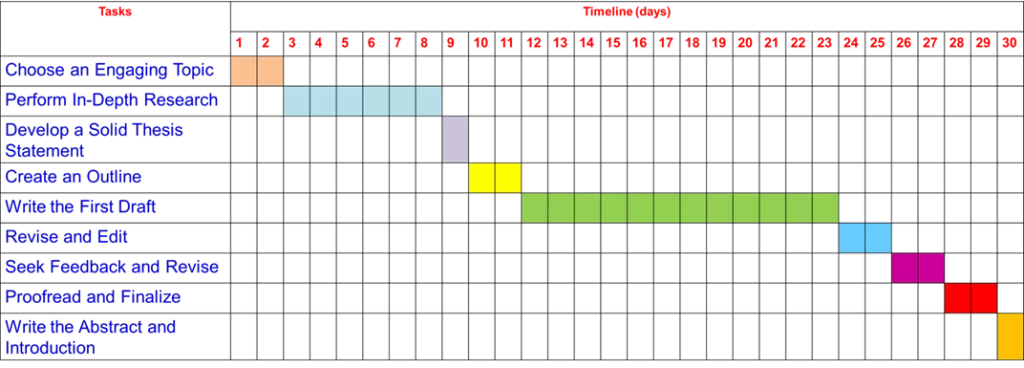
- Selecting an intriguing and research-worthy topic is the first crucial step.
- Spend some time brainstorming ideas, exploring academic journals, and consulting your professor or advisor.
- Ensure your topic is specific, manageable, and aligns with your field of study.
- Dedicate a significant portion of time to conducting thorough research.
- Utilize academic databases, online libraries, and reputable sources to gather relevant information.
- Make sure to take detailed notes and organize your sources using a citation management tool such as EndNote or Zotero.
Top 5 Free Reference Management Software for Research
- Based on your research, craft a clear and concise thesis statement that summarizes the main argument or focus of your paper.
- Your thesis statement should be specific and supportable with evidence from your research.
- Construct a well-organized outline that serves as a roadmap for your paper .
- Divide your research into sections and sub-sections, ensuring a logical flow of ideas.
- This step will help you maintain coherence throughout the writing process.
- Begin writing your paper based on the outline you created.
- Aim to complete a specific number of pages or sections each day, keeping in mind the deadline.
- Focus on expressing your ideas and arguments clearly, avoiding perfectionism during this initial draft.
- Once the first draft is complete, take a break for a day to gain a fresh perspective.
- Return to your paper and start revising it critically.
- Pay attention to sentence structure, grammar , and clarity.
- Eliminate any unnecessary information and ensure that your arguments are supported by evidence.
- Share your paper with peers , professors, and experts to obtain valuable feedback.
- Consider their suggestions and incorporate necessary changes into your paper.
- This step helps improve the overall quality of your work and ensures it meets the required standards.
- Proofread your paper meticulously, checking for spelling errors, typos, and formatting inconsistencies.
- Ensure that your paper adheres to the specified citation style (APA, MLA, etc.).
- Verify that your references are accurately cited and cross-checked with your citation management tool.
- Craft a concise abstract that summarizes the key points of your paper.
- Then, write an engaging introduction that introduces the topic, provides background information, and presents your thesis statement.
- These sections should capture the reader’s attention and provide a clear context for your research.
- Finally, submit the paper to a reputed journal.
- Plan your time: Create a realistic timeline that outlines the tasks you need to complete at each stage of the research paper writing process.
- Select a focused topic: Choose a research topic that is manageable and aligns with your interests and available resources.
- Conduct efficient research: Utilize online databases, academic journals, and credible sources to gather relevant information quickly. Take organized notes to streamline your writing process.
- Develop a strong thesis statement: Formulate a clear and concise thesis statement that outlines the main argument or objective of your research paper.
- Create an outline: Structure your research paper by creating a detailed outline that includes the introduction, main body paragraphs, and conclusion. This will help you maintain a logical flow throughout your writing.
- Break it down into smaller tasks: Divide your research paper into smaller, manageable tasks such as literature review, data analysis, and drafting different sections. This approach will make the writing process less overwhelming.
- Stay focused and organized: Maintain a distraction-free work environment, organize your research materials, and keep track of your sources to save time when citing references.
- Write regularly: Set aside dedicated time each day for writing. Even if it’s just a small portion of your paper, consistent progress will help you stay on track.
- Edit and revise: Allocate time for editing and proofreading your research paper. Check for clarity, coherence, grammar, and spelling errors to ensure a polished final product.
- Seek feedback: Share your draft with peers, professors, or writing centers for valuable feedback. Incorporate suggestions and refine your paper further for a well-rounded research outcome.
By following these tips, you can effectively write a research paper within a month while maintaining a high standard of quality and academic integrity.
Conclusion:
Writing a research paper within a month is an achievable goal if you follow a systematic approach. By allocating time to each stage of the process, from topic selection to final proofreading, you can efficiently complete a well-researched and well-written paper. Always stay focused, organize your thoughts, seek feedback, and revise your work. With determination and proper planning, you can produce a high-quality research paper that contributes to your field of study. Happy researching!

- accelerated academic writing
- deadline-driven writing
- effective research
- efficient writing
- fast research paper
- quick research paper
- Research Methodology
- research organization
- Research Paper Writing
- research planning
- research process
- research productivity
- research strategies
- research tips and tricks
- Scopus Journals
- time management tips
- time-bound research paper
- writing hacks
- writing process
- writing techniques
Tips to Prepare PhD viva-voce Presentation Slides
10 ai software tools to outlining a research paper, 480 ugc-care list of journals – science – 2024, email subscription.

iLovePhD is a research education website to know updated research-related information. It helps researchers to find top journals for publishing research articles and get an easy manual for research tools. The main aim of this website is to help Ph.D. scholars who are working in various domains to get more valuable ideas to carry out their research. Learn the current groundbreaking research activities around the world, love the process of getting a Ph.D.
WhatsApp Channel
Join iLovePhD WhatsApp Channel Now!
Contact us: [email protected]
Copyright © 2019-2024 - iLovePhD
- Artificial intelligence

The PhD Discussion Chapter: What It Is & How To Write It
Sep 11, 2023

Your PhD discussion chapter is your thesis’s intellectual epicenter. Think of it as the scholarly equivalent of a courtroom closing argument, where you summarise the evidence and make your case. Perhaps that’s why it’s so tricky – the skills you need in your discussion chapter aren’t skills you’ve likely had to deploy before: it’s where you start to speak like a Doctor.
In this guide, I want to present a comprehensive guide to the PhD discussion chapter. We’ll look at a number of key topics:
What is the purpose of a PhD Discussion Chapter?
- Suggested outlines for a discussion chapter:
Advice for improving your discussion chapter
This is not a normal blog subscription.
Each week we send two short, thought-provoking emails that will make you think differently about what it means to be a PhD student. It is designed to be read in thirty seconds and thought about all day.
The PhD discussion chapter is the place where your findings, research questions, literature, theoretical framework and methodology coalesce into a coherent narrative. A common pitfall is when students see the discussion chapter as a summary of everything that has come before. This isn’t the case. Instead, the PhD discussion chapter offers a deep, analytical synthesis of your research, providing context, interpretation, and evaluation of your findings.
It’s the place in which you engage with existing theories, explore the significance of your work, and directly address the “So What?” question, highlighting the real-world implications and academic contributions of your research.
Let’s dig down into each of these things.
Summarising and explaining the research
Before you launch into the detail, start by laying out your findings in a clear, easy to follow way. This is typically done in the introduction and the first proper section of the chapter.
Starting the PhD discussion chapter by clearly laying out your findings serves as an anchor for your reader and sets the stage for the more complex discussions that follow. This foundational step ensures that the reader is equipped with all the necessary information to fully grasp the significance and implications of your work. It’s akin to laying the groundwork before building a complex structure; without a solid base, the intricate analyses may lose their impact or be misunderstood.
For example, if you’re a PhD student in environmental science studying the effects of a specific pollutant on marine life, begin by presenting the key data points, such as the pollutant concentration levels in various regions and the corresponding health indices of marine species studied. Use tables, figures, or graphs to help visualise the data and make it more accessible.
- Laying out Quantitative Findings : If your research is quantitative, use statistical measures to present your results. Clearly state the metrics you’ve considered, such as means, variances, p-values, etc., and what they imply about your research question.
- Laying out Qualitative Findings : In case of qualitative research, such as ethnographic studies or interviews, narrate the trends, patterns, or themes that have emerged. Use representative quotes or observations as illustrative examples.
- Mixed-Methods Approach : If you’ve used both quantitative and qualitative methods, start by outlining how these different types of data will be integrated in your discussion. This could involve presenting the qualitative findings as a contextual backdrop for quantitative data or vice versa.
Remember, your objective at this initial stage is not to overwhelm the reader with complexity but to build a transparent, easily-followable narrative of what you’ve found. By starting with a clear presentation of your findings, you’re laying the groundwork for a powerful, credible discussion chapter that can tackle sophisticated analyses and weighty implications, underpinned by a comprehensible and compelling dataset.
There will be a necessary degree of overlap and repetition between this section (and the discussion chapter in general) and the findings chapter. However, there’s a subtle difference in the way in which the data is introduced in the findings and discussion chapters .
In the findings chapter, you’re generally presenting raw data or observations without interpreting what they mean. In the Discussion chapter, you take those same findings and begin to explore their implications, relate them to existing theories, and evaluate their significance. The danger, however, lies in creating excessive repetition between the two chapters, which can fatigue the reader and dilute the impact of your arguments.
To mitigate this, consider employing the following strategies:
- Selective Highlighting : Choose only the most critical findings to revisit in the Discussion chapter. You don’t need to regurgitate every data point, only those central to the questions you aim to answer in this chapter.
- Narrative Framing : When you bring up a finding in the Discussion chapter, introduce it as a stepping stone to a broader point or argument, rather than an isolated fact. This technique helps the reader understand why you’re revisiting this information and what new aspects you’ll be unveiling.
- Use Different Presentation Formats : If the Findings chapter is heavy on tables and figures, consider summarising key points in a narrative form in the Discussion chapter or vice versa.
By thoughtfully selecting what to revisit and framing it within a new context, you can transform what might appear as repetition into a coherent and evolving narrative that adds value to your thesis. Read more about the difference between the findings and discussion chapters here .
Interpreting and Contextualising Results
It’s in the discussion chapter that you offer the interpretation and context for your research findings.
Here, you transition from being a data ‘gatherer’ to a data ‘interpreter’, weaving together the threads of research questions, data, methods, literature and theory to tell a complex story. While the Results chapter may offer the “what,” the PhD discussion chapter sheds light on the “why” and “how.”
For example, if you’re a social scientist studying the effects of social media on mental health, your results chapter might show statistical data indicating a correlation between social media use and anxiety. However, it’s in your discussion chapter that you would compare these findings to existing literature, perhaps linking them to existing theories or debates. This adds a layer of depth and context that transcends the numerical data, inviting academic dialogue and potential future research avenues.
There are three ways in which you can synthesise your findings:
- Interpretation : Begin by interpreting your findings. Use comparisons, contrasts, and correlations to explain the significance of the results. This is where you should also address any unexpected outcomes and explain them.
- Contextualisation : After interpretation, provide a context to situate your findings within the existing body of knowledge. Link back to your Literature Review and Theoretical Framework to show how your research aligns with or diverges from previous work. More on this below.
- Evaluation : Finally, critically evaluate your own research. Discuss its limitations, the implications of your findings, and offer recommendations for future research.
Whether you’re in natural sciences exploring a new chemical compound or in humanities dissecting a piece of classical literature, the discussion chapter is your opportunity to show that your research not only answers specific questions but also contributes to a wider understanding of your field. It’s not enough to say, for instance, that a new drug successfully reduced symptoms of depression in 60% of study participants. You must explore what that 60% means.
- Is it a statistically significant improvement over existing treatments?
- What might be the physiological or psychological mechanisms at work?
- Could your research method have influenced these outcomes?
There’s an art to explaining and synthesising your findings [Link to “How to Explain Your Findings”], but think of it this way: this is where you shine a light on the ‘why’ and ‘how’ of your findings, delving into the nuances that raw data can’t express.
Evaluating Existing Theories and Models
Beyond explaining your findings, the PhD discussion chapter allows you to evaluate the existing theories and models that you’ve cited in your literature review and/or theory framework chapter (not sure of the difference? Click here) . Your results could either reinforce established theories or challenge them, both of which significantly contribute to your field.
- For instance, did your research on renewable energy technologies confirm the economic theories suggesting that green energy can be cost-effective?
- Or did your social research provide empirical evidence that contradicts widely held beliefs in your field?
The PhD discussion chapter therefore serves as the space where the theories, concepts, ideas and hypotheses that make up and informed your theory framework and which you touched upon in your literature review intersect with the empirical data you’ve presented.
You’re not just mapping your findings onto the theories and models; you’re dissecting them, affirming or challenging them, and potentially even extending or refining them based on what you’ve discovered.
For instance, if you’re working on a thesis in psychology concerning cognitive development in early childhood, your Literature Review may have discussed Piaget’s stages of cognitive development. However, let’s say your findings indicate some nuances or exceptions to Piaget’s theories, or perhaps children in a certain demographic don’t follow the stages as previously thought.
Your discussion chapter is where you can make the argument that perhaps Piaget’s model, while generally accurate, might require some modification to account for these cases.
- Affirming Theories : If your data aligns closely with the existing theories and models, the PhD discussion chapter serves to strengthen their credibility. Here, you’re lending empirical support to theoretical frameworks.
- Challenging Theories : Alternatively, your findings might contradict or challenge the prevailing theories. This is not a shortcoming; instead, it opens the door for re-evaluation and progress in the field, which is just as valuable.
- Extending or Refining Theories : Perhaps your research uncovers additional variables or conditions that existing models have not accounted for. In such cases, you’re pushing the envelope, extending the current boundaries of understanding.
As you evaluate existing theories and models, be comprehensive yet nuanced. Draw on varied disciplines if relevant. For example, if your thesis is at the intersection of public health and social policy, integrate models from both fields to offer a multi-faceted discussion. Being interdisciplinary can make your discussion richer and more impactful.
Ultimately, the discussion chapter offers you a platform to voice your scholarly interpretation and judgment. You’re participating in a broader academic dialogue, not just narrating your findings but positioning them in a web of knowledge that spans across time, disciplines, and viewpoints.
Discuss Unexpected Results
The discussion chapter is where you also discuss things that didn’t quite work out as planned. In particular, results that were unexpected.
Sometimes the most perplexing data offers the most valuable insights. Don’t shy away from discussing unexpected results; these could be the starting points for future research or even paradigm shifts in your field.
When your research yields findings that diverge from established theories or commonly held beliefs, you’re offered a unique opportunity to challenge and extend existing knowledge.
Take the field of primary education as an illustrative example. Assume you’re researching the efficacy of a specific teaching methodology that prior studies have lauded. However, your data reveals that while the method works wonders for one subgroup of students, it fails to benefit another subgroup. Far from diminishing the value of your research, this unexpected outcome presents an exciting opening. It beckons further inquiry into why the teaching methodology yielded disparate impacts, which could eventually result in more tailored and effective educational strategies.
In the realm of scientific discoveries, the significance of unexpected results cannot be overstated. Alexander Fleming’s accidental discovery of penicillin originated from what appeared to be a ‘failed’ experiment, but it revolutionised medicine. Similarly, the unintended discovery of cosmic microwave background radiation provided pivotal support for the Big Bang theory. In both instances, what seemed like anomalies paved the way for transformative understanding.
The first task when you encounter unexpected findings is to set them apart from the expected outcomes clearly. Delineate a specific section in your discussion chapter to delve into these anomalies, affording them the attention they merit.
Next, engage in hypothesising why these peculiarities emerged. This could be the point where your years of study and your depth of understanding of your subject really shine. Are there confounding variables that weren’t initially apparent? Could there be an entirely unexplored underlying mechanism at play? Take your reader on this exploration with you, and offer educated guesses based on your literature review and study design.
Lastly, don’t forget to consider and discuss the wider implications of these findings. Could they potentially refute longstanding theories or present the need for a shift in the prevailing school of thought? Or perhaps they hint at previously unthought-of applications or solutions to existing problems? Reflect on how these unexpected results might fit into the broader academic conversation and where future research might take these findings.
By earnestly and transparently tackling unexpected results, you exhibit a commitment to rigorous academic research. The willingness to entertain complexity and to follow the research—even when it leads in unpredictable directions—is a mark of scholarly integrity and courage. This holds true irrespective of your academic discipline, from the humanities and social sciences to STEM fields.
Answering the “so what?” Question
In your findings chapter you would have presented the data. In the discussion chapter, you answer the ‘so what’ question. Make sure to address it explicitly. Why does your research matter? Who benefits from it? How does it advance the scholarly discourse?
As a PhD student, you’ve already invested a substantial amount of time and effort into your research. Therefore, it’s crucial to articulate its importance not only to validate your own work but also to contribute meaningfully to your field and, in some cases, to society at large.
Answering the “so what?” question means connecting the dots between your isolated research findings and the larger intellectual landscape. It requires you to extend your analysis beyond the specifics of your study, considering how it advances the scholarly discourse in your field. For instance, if your research closes a significant gap in the literature, makes a theoretical breakthrough,
Example in Public Health : If your research finds that community-led sanitation programs are far more effective than government-implemented ones, then the “So What?” is clear: policy-makers need to see this data. But that doesn’t mean you don’t still need to discuss it.
Example in Literature : If your research uncovers previously unnoticed patterns of symbolism in 19th-century Russian literature, the “So What?” could be a deeper understanding of how literature reflects societal anxieties of the time.
In order to make your discussion chapter compelling and relevant, it’s imperative to always highlight why your research matters. This goes beyond simply reiterating your findings; you need to connect the dots and show how your research fits into the broader academic landscape. Are you challenging existing theories, confirming previous studies, or offering a new perspective? Establishing the academic importance of your work provides a solid footing for its wider application.
Further to establishing academic relevance, also aim to illuminate the real-world implications of your findings. What are the practical outcomes that could arise from your research? Are there specific scenarios or applications where your research could be a game-changer? For instance, if your study uncovers a more effective method of teaching reading to children with dyslexia, explicitly mention how this could revolutionise educational approaches and improve quality of life for those affected. Providing concrete scenarios enhances the applicability of your research, proving that it doesn’t merely exist in the realm of academic abstraction, but has tangible impacts that can affect change.
Limitations and Future Research
The quest for perfection is more a journey than a destination. This especially holds true in the context of a PhD thesis. Therefore, a well-crafted Discussion chapter should include a section devoted to the limitations of your research, as it establishes the scope, reliability, and validity of your work. Acknowledging limitations is not an act of undermining your research; instead, it embodies scholarly integrity and rigorous academic thinking.
Being upfront about limitations is essentially about being honest, not only with your readers but also with yourself as a researcher. For instance, if you’ve conducted a survey-based study in psychology but only managed to collect a small number of responses, admitting this limitation provides context for your findings. Perhaps the conclusions drawn from such a sample size are not universally applicable but could still offer significant insights into a particular demographic or condition
- Do not shy away from discussing limitations in fear that it might weaken your arguments.
- Clearly delineate the scope of your research, specifying what it does and doesn’t address.
For example, in a medical research study, if your sample size predominantly consists of individuals from a particular age group, admitting this limitation helps frame your research within that context. Or, if you’re a literature student, if your analysis focuses solely on the works of a single author, your findings might not be generalisable to broader literary trends.
Discussing limitations openly doesn’t devalue your work; it adds a layer of trustworthiness. It assures the reader—and the academic community at large—that you have a nuanced understanding of your research context. It demonstrates that you can critically evaluate your own work, a skill that is paramount.

Your PhD Thesis. On one page.
Example outline for a discussion chapter:.
I’ve included a suggested outline for a PhD discussion chapter. It’s important to note that no two PhDs are alike, and yours may well (probably will) diverge from this. The purpose here is to show how all the various factors we’ve discussed above fit together.
Introduction
- Brief Overview of Research Objectives and Key Findings
- Purpose of the Discussion Chapter

Summary of Key Findings
- Brief Restatement of Research Findings
- Comparison with Initial Hypotheses or Research Questions
Interpretation of Findings
- Contextualisation of Results
- Significance and Implications of the Findings
Evaluation of Existing Theories and Models
- How Your Findings Support or Challenge Previous Work
- Conceptual Contributions of Your Study
- Acknowledgment of Study Limitations
- Suggestions for Future Research
- Summation of Key Points
- Broader Implications and Contributions of the Research
- Final Thoughts and Future Directions
Once you’ve navigated through the complexities of your PhD research, you’re now faced with the challenge of bringing it all together in your discussion chapter. While you’ve already considered various facets like summarising findings, evaluating existing theories, and acknowledging limitations, there are some “easy wins”—small, yet impactful steps—that can help strengthen this critical chapter.
The Power of a Well-Structured Narrative
Begin with a well-structured narrative that clearly outlines your arguments. Tell the reader what the destination is at the outset of the chapter, and then make sure each paragraph is a stepping stone to that destination.
Each paragraph should serve a purpose and should logically follow the previous one. This helps in making your discussion coherent and easy to follow.
- Use transition sentences between paragraphs to guide the reader through your argument.
- Make sure each paragraph adds a new dimension to your discussion.
Data Visualisation Tools
Visual aids aren’t just for presentations; they can provide tremendous value in a discussion chapter. Diagrams, charts, or graphs can provide a visual break and help to emphasise your points effectively.
- Use graphs or charts to represent trends that support your argument.
- Always caption your visuals and reference them in the text.
Integrate Feedback Actively
It’s often beneficial to have colleagues, advisors, or other experts review your discussion section before finalising it. They can offer fresh perspectives and may catch gaps or ambiguities that you’ve missed.
- Seek feedback but also know when to filter it, sticking to advice that genuinely enhances your work.
- Don’t wait until the last minute for feedback; give reviewers ample time.
Highlight the Broader Implications
While you’ll delve into this more in your conclusion, don’t shy away from previewing the broader implications of your work in your discussion. Make it clear why your research matters in a wider context.
- State the broader implications but keep them tightly related to your research findings.
- Avoid making grand claims that your research can’t support
In the journey toward a PhD, learning ‘how to write like a doctor’ is more than mastering grammar or honing your prose; it’s about flexing your academic muscles with confidence and authority. It is in the discussion chapter that you really start flexing, and which you really can and need to speak like a doctor.
For many, this is the first instance of challenging the hegemony of existing literature, refuting established theories, or proposing innovative frameworks. It’s an intimidating task; after all, these are the ideas and research paradigms you’ve been learning about throughout your educational journey. Suddenly, you’re not just absorbing knowledge; you’re contributing to it, critiquing it, and perhaps even changing its trajectory. If it feels challenging, remember that’s because it’s new, and that’s why it’s hard. However, you’ve made it this far, and that alone testifies to your academic rigour and capability. You’ve earned the right to be heard; now it’s time to speak with the academic authority that has been years in the making. So, don’t hold back—flex those academic muscles and carve your niche in the scholarly conversation.

Share this:
Submit a comment cancel reply.
Your email address will not be published. Required fields are marked *

Search The PhD Knowledge Base
Most popular articles from the phd knowlege base.
The PhD Knowledge Base Categories
- Your PhD and Covid
- Mastering your theory and literature review chapters
- How to structure and write every chapter of the PhD
- How to stay motivated and productive
- Techniques to improve your writing and fluency
- Advice on maintaining good mental health
- Resources designed for non-native English speakers
- PhD Writing Template
- Explore our back-catalogue of motivational advice
- Enroll & Pay
- Prospective Undergraduate Students
- Prospective Graduate Students
- Current Students
Ph.D. Creative Writing
Ph.d. in creative writing.
A rigorous program that combines creative writing and literary studies, the Ph.D. in Creative Writing prepares graduates for both scholarly and creative publication and teaching. With faculty guidance, students admitted to the Ph.D. program may tailor their programs to their goals and interests.
The creative writing faculty at KU has been widely published and anthologized, winning both critical and popular acclaim. Faculty awards include such distinctions as the Nebula Award, Hugo Award, Osborn Award, Shelley Memorial Award, Gertrude Stein Award, the Kenyon Review Prize, the Kentucky Center Gold Medallion, and the Pushcart Prize.
Regarding admission to both our doctoral and MFA creative writing programs, we will prioritize applicants who are interested in engaging with multiple faculty members to practice writing across genres and forms, from speculative fiction and realism to poetry and playwriting/screenwriting, etc.
The University of Kansas' Graduate Program in Creative Writing also offers an M.F.A degree .
Opportunities
A GTA appointment includes a tuition waiver for ten semesters plus a competitive stipend. In the first year, GTA appointees teach English 101 (first year composition) and English 102 (a required reading and writing course). Creative Writing Ph.D. students may have the opportunity to teach an introductory course in creative writing after passing the doctoral examination, and opportunities are available for a limited number of advanced GTAs to teach in the summer.
Department Resources
- Graduate Admissions
- Graduate Contacts
- Master of Fine Arts (M.F.A.)
Affiliated Programs
- LandLocked Literary Magazine
- The Project on the History of Black Writing
- Center for the Study of Science Fiction
- Ad-Hoc African/Americanists and Affiliates
Degree Requirements
- At least 24 hours of credit in appropriate formal graduate courses beyond the M.A. or M.F.A. At least 15 hours (in addition to ENGL 800 if not taken for the M.A.) of this course work must be taken from among courses offered by the Department of English at the 700-level and above. English 997 and 999 credits cannot be included among the 24 hours. Students may petition to take up to 6 hours outside the Department.
- ENGL 800: Methods, Theory, and Professionalism (counts toward the 24 required credit hours).
- The ENGL 801/ENGL 802 pedagogy sequence (counts toward the 24 required credit hours).
- Two seminars (courses numbered 900 or above) offered by the Department of English at the University of Kansas, beyond the M.A. or M.F.A. ENGL 998 does not fulfill this requirement.
- ENGL 999, Dissertation (at least 12 hours).
If the M.A. or M.F.A. was completed in KU’s Department of English, a doctoral student may petition the DGS to have up to 12 hours of the coursework taken in the English Department reduced toward the Ph.D.
For Doctoral students, the university requires completion of a course in responsible scholarship . For the English department, this would be ENGL 800, 780, or the equivalent). In addition, the Department requires reading knowledge of one approved foreign language: Old English, French, German, Spanish, Italian, Russian, Japanese, Greek, Latin, or Hebrew. Upon successful petition, a candidate may substitute reading knowledge of another language or research skill that is studied at the University or is demonstrably appropriate to the candidate’s program of study.
Doctoral students must fulfill the requirement before they take their doctoral examination, or be enrolled in a reading course the same semester as the exam. Students are permitted three attempts at passing each foreign language or research skill. Three methods of demonstrating reading knowledge for all approved languages except Old English are acceptable:
- Presenting 16 hours, four semesters, or the equivalent of undergraduate credit, earned with an average of C or better.
- Passing a graduate reading course at the University of Kansas or peer institution (e.g., French 100, German 100, etc.) with a grade of C or higher. In the past, some of these reading courses have been given by correspondence; check with the Division of Continuing Education for availability.
- Passing a translation examination given by a designated member of the English Department faculty or by the appropriate foreign language department at KU. The exam is graded pass/fail and requires the student to translate as much as possible of a representative text in the foreign language in a one-hour period, using a bilingual dictionary.
- Passing a translation examination given by the appropriate foreign language department at the M.A.-granting institution. Successful completion must be reflected either on the M.A. transcript or by a letter from the degree-granting department.
To fulfill the language requirement using Old English, students must successfully complete ENGL 710 (Introduction to Old English) and ENGL 712 (Beowulf).
Post-Coursework Ph.D. students must submit, with their committee chair(s), an annual review form to the DGS and Graduate Committee.
Doctoral students must take their doctoral examination within three semesters (excluding summers) of the end of the semester in which they took their final required course. If a student has an Incomplete, the timeline is not postponed until the Incomplete is resolved. For example, a student completing doctoral course work in Spring 2018 will need to schedule their doctoral exam no later than the end of Fall semester 2019. Delays may be granted by petition to the Graduate Director in highly unusual circumstances. Failure to take the exam within this time limit without an approved delay will result in the student’s falling out of good standing. For details on the consequences of falling out of good standing, see “Falling Out of Good Standing,” in General Department Policies and Best Practices.
A student may not take their doctoral exam until the university’s Research Skills and Responsible Scholarship requirement is fulfilled (ENGL 800 or equivalent and reading knowledge of one foreign language or equivalent).
Requirements for Doctoral Exams
Reading Lists:
All students are required to submit three reading lists, based on the requirements below, to their committee for approval. The doctoral exam will be held on a date at least twelve weeks after the approval from the whole committee is received. To facilitate quick committee approval, students may copy the graduate program coordinator on the email to the committee that contains the final version of the lists. Committee members may then respond to the email in lieu of signing a printed copy. Students should work with their committee chair and graduate program coordinator to schedule the exam at the same time as they finalize the lists.
During the two-hour oral examination (plus an additional 15-30 minutes for a break and committee deliberation), a student will be tested on their comprehension of a literary period or movement, including multiple genres and groups of authors within that period or movement. In addition, the student will be tested on two of the following six areas of study:
- An adjacent or parallel literary period or movement,
- An author or group of related authors,
- Criticism and literary theory,
- Composition theory, and
- English language.
No title from any field list may appear on either of the other two lists. See Best Practices section for more details on these six areas. See below for a description of the Review of the Dissertation Proposal (RDP), which the candidate takes the semester after passing the doctoral exam.
While many students confer with the DGS as they begin the process of developing their lists, they are also required to submit a copy of their final exam list to the DGS. Most lists will be left intact, but the DGS might request that overly long lists be condensed, or extremely short lists be expanded.
Review of Literature
The purpose of the Review of Literature is to develop and demonstrate an advanced awareness of the critical landscape for each list. The student will write an overview of the defining attributes of the field, identifying two or three broad questions that animate scholarly discussion, while using specific noteworthy texts from their list ( but not all texts on the list ) as examples.
The review also must accomplish the following:
- consider the historical context of major issues, debates, and trends that factor into the emergence of the field
- offer a historical overview of scholarship in the field that connects the present to the past
- note recent trends and emergent lines of inquiry
- propose questions about (develop critiques of, and/or identify gaps in) the field and how they might be pursued in future study (but not actually proposing or referencing a dissertation project)
For example, for a literary period, the student might include an overview of primary formal and thematic elements, of the relationship between literary and social/historical developments, of prominent movements, (etc.), as well as of recent critical debates and topics.
For a genre list, the Review of Literature might include major theories of its constitution and significance, while outlining the evolution of these theories over time.
For a Rhetoric and Composition list, the review would give an overview of major historical developments, research, theories, methods, debates, and trends of scholarship in the field.
For an English Language Studies (ELS) list, the review would give an overview of the subfields that make up ELS, the various methodological approaches to language study, the type of sources used, and major aims and goals of ELS. The review also usually involves a focus on one subfield of particular interest to the student (such as stylistics, sociolinguistics, or World/Postcolonial Englishes).
Students are encouraged to divide reviews into smaller sections that enhance clarity and organization. Students are not expected to interact with every text on their lists.
The review of literature might be used to prepare students for identifying the most important texts in the field, along with why those texts are important to the field, for the oral exam. It is recommended for students to have completed reading the bulk of (if not all) texts on their lists before writing the ROL.
The Reviews of Literature will not be produced in an exam context, but in the manner of papers that are researched and developed in consultation with all advisors/committee members, with final drafts being distributed within a reasonable time for all members to review and approve in advance of the 3-week deadline . While the Review of Literature generally is not the focus of the oral examination, it is frequently used as a point of departure for questions and discussion during the oral examination.
Doctoral Exam Committee
Exam committees typically consist of 3 faculty members from the department—one of whom serves as the Committee Chair—plus a Graduate Studies Representative. University policy dictates the composition of exam committees . Students may petition for an exception for several committee member situations, with the exception of the Graduate Studies Representative .
If a student wants to have as a committee member a person outside the university, or a person who is not in a full-time tenure-track professorship at KU, the student must contact the Graduate Secretary as early as possible. Applications for special graduate faculty status must be reviewed by the College and Graduate Studies. Requests for exam/defense approval will not be approved unless all committee members currently hold either regular or special graduate faculty status
Remote participation of committee members via technology
Students with committee members who plan to attend the defense via remote technology must be aware of college policy on teleconferencing/remote participation of committee members .
A majority of committee members must be physically present for an examination to commence; for doctoral oral examinations this requirement is 2 of the 4 members, for master’s oral examinations the requirement is 2 of the 3 members. In addition, it is required that the student being examined, the chair of the committee, and the Graduate Studies Representative all be physically present at the examination or defense. Mediated attendance by the student, chair and Grad Studies Rep is prohibited.
The recommended time between completion of coursework and the doctoral examination is two semesters.
Final exam lists need to be approved and signed by the committee at least 12 weeks prior to the prospective exam date. This includes summers/summer semesters. The lists should then be submitted to the Graduate Program Coordinator. Reviews of Literature need to be approved and signed by the committee at least 3 weeks prior to the exam date. Failure to meet this deadline will result in rescheduling the exam. No further changes to lists or Reviews of Literature will be allowed after official approval. The three-week deadline is the faculty deadline--the last date for them to confirm receipt of the ROLs and confer approval--not necessarily the student deadline for submitting the documents to the faculty. Please keep that timing in mind and allow your committee adequate time to review the materials and provide feedback.
Students taking the Doctoral Exam are allowed to bring their text lists, the approved Reviews of Literature, scratch paper, a writing utensil, and notes/writing for an approximately 5-minute introductory statement to the exam. (This statement does not need to lay out ideas or any aspect of the dissertation project.)
Each portion of the oral examination must be deemed passing before the student can proceed to the Review of the Dissertation Proposal. If a majority of the committee judges that the student has not answered adequately on one of the three areas of the exam, the student must repeat that portion in a separate oral exam of one hour, to be taken as expeditiously as possible. Failure in two areas constitutes failure of the exam and requires a retake of the whole. The doctoral examining committee will render a judgment of Satisfactory or Unsatisfactory on the entire examination. A student who fails the exam twice may, upon successful petition to the Graduate Committee, take it a third and final time.
Students cannot bring snacks, drinks, treats, or gifts for committee members to the exam. Professors should avoid the appearance of favoritism that may occur if they bring treats to some student exams but not others.
The doctoral oral examination has the following purposes:
- To establish goals, tone, and direction for the pursuit of the Ph.D. in English for the Department and for individual programs of study;
- To make clear the kinds of knowledge and skills that, in the opinion of the Department, all well-prepared holders of the degree should have attained;
- To provide a means for the Department to assess each candidate’s control of such knowledge and skills in order to certify that the candidate is prepared to write a significant dissertation and enter the profession; and
- To enable the Department to recommend to the candidate areas of strength or weakness that should be addressed.
In consultation with the Graduate Director, a student will ask a member of the Department’s graduate faculty (preferably their advisor) to be the chairperson of the examining committee. The choice of examination committee chair is very important, for that person’s role is to assist the candidate in designing the examination structure, preparing the Review of Literature (see below), negotiating reading lists and clarifying their purposes, and generally following procedures here outlined. The other three English Department members of the committee will be chosen in consultation with the committee chair. (At some point an additional examiner from outside the Department, who serves as the Graduate School representative, will be invited to join the committee). Any unresolved problems in negotiation between a candidate and their committee should be brought to the attention of the Graduate Director, who may choose to involve the Graduate Committee. A student may request a substitution in, or a faculty member may ask to be dismissed from, the membership of the examining committee. Such requests must be approved, in writing, by the faculty member leaving the committee and by the Graduate Director.
Reading Lists
Copies of some approved reading lists and Reviews of Literature are available from the Graduate Secretary and can be found on the U: drive if you are using a computer on campus. Despite the goal of fairness and equity, some unavoidable unevenness and disparity will appear in the length of these lists. It remains, however, the responsibility of the examining committee, and especially the student’s chair, to aim toward consonance with the most rigorous standards and expectations and to insure that areas of study are not unduly narrow.
To facilitate quick committee approval, students may copy the graduate secretary on the email to the committee that contains the final version of the lists and reviews of literature. Committee members may then respond to the email in lieu of signing a printed copy.
Comprehension of a literary period (e.g., British literature of the 18th century; Romanticism; US literature of the 19th century; Modernism) entails sufficient intellectual grasp of both the important primary works of and secondary works on the period or movement to indicate a student’s ability to teach the period or movement and undertake respectable scholarship on it.
Comprehension of an author or group of related authors (e.g., Donne, the Brontës, the Bloomsbury Group, the Black Mountain Poets) entails knowledge, both primary and secondary, of a figure or figures whose writing has generated a significant body of interrelated biographical, historical, and critical scholarship.
Comprehension of one of several genres (the short story, the lyric poem, the epistolary novel). To demonstrate comprehension of a genre, a student should possess sufficient depth and breadth of knowledge, both primary and secondary, of the genre to explain its formal characteristics and account for its historical development.
Comprehension of criticism and literary theory entails a grasp of fundamental conceptual problems inherent in a major school of literary study (e.g., historicist, psychoanalytic, feminist, poststructuralist, etc.). To demonstrate comprehension of that school of criticism and literary theory, a student should be able to discuss changes in its conventions and standards of interpretation and evaluation of literature from its beginning to the present. Students will be expected to possess sufficient depth and breadth of theoretical knowledge to bring appropriate texts and issues to bear on questions of literary study.
Comprehension of composition theory entails an intellectual grasp of fundamental concepts, issues, and theories pertaining to the study of writing. To demonstrate comprehension of composition theory, students should be able to discuss traditional and current issues from a variety of perspectives, as well as the field’s historical development from classical rhetoric to the present.
Comprehension of the broad field of English language studies entails a grasp of the field’s theoretical concepts and current issues, as well as a familiarity with significant works within given subareas. Such subareas will normally involve formal structures (syntax, etc.) and history of the English language, along with other subareas such as social linguistics, discourse analysis, lexicography, etc. Areas of emphasis and specific sets of topics will be arranged through consultation with relevant faculty.
Ph.D. candidates must be continuously enrolled in Dissertation hours each Fall and Spring semester from the time they pass the doctoral examination until successful completion of the final oral examination (defense of dissertation).
- Students enroll for a minimum of 6 hours each Fall and Spring semester until the total of post-doctoral exam Dissertation hours is 18. One hour each semester must be ENGL 999. In order to more quickly reach the 18-hour minimum, and to be sooner eligible for GRAships, it is highly recommended that students enroll in 9 hours of Dissertation in the Spring and Fall semesters.
- Once a student has accumulated 18 post-doctoral exam hours, each subsequent enrollment will be for a number of hours agreed upon as appropriate between the student and their advisor, the minimal enrollment each semester being 1 hour of ENGL 999.
- A student must be enrolled in at least one hour of credit at KU during the semester they graduate. Although doctoral students must be enrolled in ENGL 999 while working on their dissertations, per current CLAS regulations, there is no absolute minimum number of ENGL 999 hours required for graduation.
- Students who live and work outside the Lawrence area may, under current University regulations, have their fees assessed at the Field Work rate, which is somewhat lower than the on-campus rate. Students must petition the College Office of Graduate Affairs before campus fees will be waived.
Please also refer to the COGA policy on post-exam enrollment or the Graduate School’s policy .
As soon as possible following successful completion of the doctoral exam, the candidate should establish their three-person core dissertation committee, and then expeditiously proceed to the preparation of a dissertation proposal. Within the semester following completion of the doctoral exam , the student will present to their core dissertation committee a written narrative of approximately 10-15 pages , not including bibliography, of the dissertation proposal. While the exam schedule is always contingent on student progress, in the first two weeks of the semester in which they intend to take the review , students will work with their committee chair and the graduate program coordinator to schedule the 90-minute RDP. Copies of this proposal must be submitted to the members of the dissertation committee and Graduate Program Coordinator no later than three weeks prior to the scheduled examination date.
In the proposal, students will be expected to define: the guiding question or set of questions; a basic thesis (or hypothesis); how the works to be studied or the creative writing produced relate to that (hypo)thesis; the theoretical/methodological model to be followed; the overall formal divisions of the dissertation; and how the study will be situated in the context of prior scholarship (i.e., its importance to the field). The narrative section should be followed by a bibliography demonstrating that the candidate is conversant with the basic theoretical and critical works pertinent to the study. For creative writing students, the proposal may serve as a draft of the critical introduction to the creative dissertation. Students are expected to consult with their projected dissertation committee concerning the preparation of the proposal.
The review will focus on the proposal, although it could also entail determining whether or not the candidate’s knowledge of the field is adequate to begin the composition process. The examination will be graded pass/fail. If it is failed, the committee will suggest areas of weakness to be addressed by the candidate, who will rewrite the proposal and retake the review by the end of the following semester . If the candidate abandons the entire dissertation project for another, a new RDP will be taken. (For such a step to be taken, the change would need to be drastic, such as a move to a new field or topic. A change in thesis or the addition or subtraction of one or even several works to be examined would not necessitate a new proposal and defense.) If the student fails to complete the Review of the Dissertation Proposal within a year of the completion of the doctoral exams, they will have fallen out of departmental good standing. For details on the consequences of falling out of good standing, see “Falling Out of Good Standing,” in General Department Policies and Best Practices.
After passing the Review of the Dissertation Proposal, the student should forward one signed copy of the proposal to the Graduate Program Coordinator. The RDP may last no longer than 90 minutes.
Students cannot bring snacks, drinks, treats, or gifts for committee members to the review. Professors should avoid the appearance of favoritism that may occur if they bring treats to some student exams but not others.
The Graduate Catalog states that the doctoral candidate “must present a dissertation showing the planning, conduct and results of original research, and scholarly creativity.” While most Ph.D. candidates in the Department of English write dissertations of a traditional, research-oriented nature, a creative writing candidate may elect to do a creative-writing dissertation involving fiction, poetry, drama or nonfiction prose. Such a dissertation must also contain a substantial section of scholarly research related to the creative writing. The precise nature of the scholarly research component should be determined by the candidate in consultation with the dissertation committee and the Graduate Director. Candidates wishing to undertake such a dissertation must complete all Departmental requirements demanded for the research-oriented Ph.D. degree.
Scholarly Research Component (SRC)
The Scholarly Research Component (SRC) of the creative-writing dissertation is a separate section of the dissertation than the creative work. It involves substantial research and is written in the style of academic prose. It should be 15-20 pages and should cite at least 20 sources, some of which should be primary texts, and many of which should be from the peer-reviewed secondary literature. The topic must relate, in some way, to the topic, themes, ideas, or style of the creative portion of the dissertation; this relation should be stated in the Dissertation Proposal, which should include a section describing the student’s plans for the SRC. The SRC may be based on a seminar paper or other work the student has completed prior to the dissertation; but the research should be augmented, and the writing revised, per these guidelines. The SRC is a part of the dissertation, and as such will be included in the dissertation defense.
The SRC may take two general forms:
1.) An article, publishable in a peer-reviewed journal or collection, on a specific topic related to an author, movement, theoretical issue, taxonomic issue, etc. that has bearing on the creative portion. The quality of this article should be high enough that the manuscript could be submitted to a peer-reviewed publication, with a plausible chance of acceptance.
2.) A survey . This survey may take several different forms:
- A survey of a particular aspect of the genre of the creative portion of the dissertation (stylistic, national, historical, etc.)
- An introduction to the creative portion of the dissertation that explores the influences on, and the theoretical or philosophical foundations or implications of the creative work
- An exploration of a particular technical problem or craft issue that is salient in the creative portion of the dissertation
- If the creative portion of the dissertation includes the results of research (e.g., historical novel, documentary poetry, research-based creative nonfiction), a descriptive overview of the research undertaken already for the dissertation itself
- A combination of the above, with the prior approval of the student’s dissertation director.
The dissertation committee will consist of at least four members—two “core” English faculty members, a third faculty member (usually from English), and one faculty member from a different department who serves as the Graduate Studies representative. The committee may include (with the Graduate Director’s approval) members from other departments and, with the approval of the University’s Graduate Council, members from outside the University. If a student wants to have a committee member from outside the university, or a person who is not in a full-time tenure-track professorship at KU, the student must contact the Graduate Secretary as early as possible. Applications for special graduate faculty status must be reviewed by the College and the Office of Graduate Studies. Requests for defense approval will not be approved unless all committee members currently hold either regular or special graduate faculty status.
The candidate’s preferences as to the membership of the dissertation committee will be carefully considered; the final decision, however, rests with the Department and with the Office of Graduate Studies. All dissertation committees must get approval from the Director of Graduate Studies before scheduling the final oral exam (defense). Furthermore, any changes in the make-up of the dissertation committee from the Review of the Dissertation Proposal committee must be approved by the Director of Graduate Studies.
Once the dissertation proposal has passed and the writing of the dissertation begins, membership of the dissertation committee should remain constant. However, under extraordinary circumstances, a student may request a substitution in, or a faculty member may ask to be dismissed from, the membership of the dissertation committee. Such requests must be approved, in writing, by the faculty member leaving the committee and by the Graduate Director.
If a student does not make progress during the dissertation-writing stage, and accumulates more than one “Limited Progress” and/or “No Progress” grade on their transcript, they will fall out of good standing in the department. For details on the consequences of falling out of good standing, see “Falling Out of Good Standing,” in General Department Policies and Best Practices
Final Oral Exam (Dissertation Defense)
When the dissertation has been tentatively accepted by the dissertation committee (not including the Graduate Studies Representative), the final oral examination will be held, on the recommendation of the Department. While the exam schedule is always contingent on student progress, in the first two weeks of the semester in which they intend to defend the dissertation, students should work with their committee chair and graduate program coordinator to schedule it.
Although the dissertation committee is responsible for certification of the candidate, any member of the graduate faculty may be present at the examination and participate in the questioning, and one examiner—the Graduate Studies Representative—must be from outside the Department. The Graduate Secretary can help students locate an appropriate Grad Studies Rep. The examination normally lasts no more than two hours. It is the obligation of the candidate to advise the Graduate Director that they plan to take the oral examination; this must be done at least one month before the date proposed for the examination.
At least three calendar weeks prior to the defense date, the student will submit the final draft of the dissertation to all the committee members (including the GSR) and inform the Graduate Program Coordinator. Failure to meet this deadline will necessitate rescheduling the defense. The final oral examination for the Ph.D. in English is, essentially, a defense of the dissertation. When it is passed, the dissertation itself is graded by the dissertation director, in consultation with the student’s committee; the student’s performance in the final examination (defense) is graded by the entire five-person committee
Students cannot bring snacks, drinks, treats, or gifts for committee members to the defense. Professors should avoid the appearance of favoritism that may occur if they bring treats to some student defenses but not others
These sets of attributes are adapted from the Graduate Learner Outcomes that are a part of our Assessment portfolio. “Honors” should only be given to dissertations that are rated “Outstanding” in all or most of the following categories:
- Significant and innovative plot/structure/idea/focus. The writer clearly places plot/structure/idea/focus in context.
- Thorough knowledge of literary traditions. Clear/flexible vision of the creative work produced in relation to those literary traditions.
- Introduction/Afterword is clear, concise, and insightful. A detailed discussion of the implications of the project and future writing projects exists.
- The creative dissertation reveals the doctoral candidate’s comprehensive understanding of poetics and/or aesthetic approach. The application of the aesthetic approach is innovative and convincing.
- The creative dissertation represents original and sophisticated creative work.
- The creative dissertation demonstrates thematic and/or aesthetic unity.
After much discussion about whether the “honors” designation assigned after the dissertation defense should be for the written product only, for the defense/discussion only, for both together, weighted equally, or eradicated altogether, the department voted to accept the Graduate Committee recommendation that “honors” only apply to the written dissertation. "Honors" will be given to dissertations that are rated "Outstanding" in all or most of the categories on the dissertation rubric.
Normally, the dissertation will present the results of the writer’s own research, carried on under the direction of the dissertation committee. This means that the candidate should be in regular contact with all members of the committee during the dissertation research and writing process, providing multiple drafts of chapters, or sections of chapters, according to the arrangements made between the student and each faculty member. Though accepted primarily for its scholarly merit rather than for its rhetorical qualities, the dissertation must be stylistically competent. The Department has accepted the MLA Handbook as the authority in matters of style. The writer may wish to consult also the Chicago Manual of Style and Kate L. Turabian’s A Manual for Writers of Dissertations, Theses, and Term Papers .
Naturally, both the student and the dissertation committee have responsibilities and obligations to each other concerning the submitting and returning of materials. The student should plan on working steadily on the dissertation; if they do so, they should expect from the dissertation committee a reasonably quick reading and assessment of material submitted.
Students preparing their dissertation should be showing chapters to their committee members as they go along, for feedback and revision suggestions. They should also meet periodically with committee members to assess their progress. Prior to scheduling a defense, the student is encouraged to ask committee members whether they feel that the student is ready to defend the dissertation. Ideally, the student should hold the defense only when they have consulted with committee members sufficiently to feel confident that they have revised the dissertation successfully to meet the expectations of all committee members.
Students should expect that they will need to revise each chapter at least once. This means that all chapters (including introduction and conclusion) are shown to committee members once, revised, then shown to committee members again in revised form to assess whether further revisions are needed, prior to the submitting of the final dissertation as a whole. It is not unusual for further revisions to be required and necessary after the second draft of a chapter; students should not therefore simply assume that a second draft is necessarily “final” and passing work.
If a substantial amount of work still needs to be completed or revised at the point that the dissertation defense is scheduled, such a defense date should be regarded as tentative, pending the successful completion, revision, and receipt of feedback on all work. Several weeks prior to the defense, students should consult closely with their dissertation director and committee members about whether the dissertation as a whole is in a final and defensible stage. A project is ready for defense when it is coherent, cohesive, well researched, engages in sophisticated analysis (in its entirety or in the critical introduction of creative dissertations), and makes a significant contribution to the field. In other words, it passes each of the categories laid out in the Dissertation Rubric.
If the dissertation has not clearly reached a final stage, the student and dissertation director are advised to reschedule the defense.
Prior Publication of the Doctoral Dissertation
Portions of the material written by the doctoral candidate may appear in article form before completion of the dissertation. Prior publication does not ensure the acceptance of the dissertation by the dissertation committee. Final acceptance of the dissertation is subject to the approval of the dissertation committee. Previously published material by other authors included in the dissertation must be properly documented.
Each student beyond the master’s degree should confer regularly with the Graduate Director regarding their progress toward the doctoral examination and the doctorate.
Doctoral students may take graduate courses outside the English Department if, in their opinion and that of the Graduate Director, acting on behalf of the Graduate Committee, those courses will be of value to them. Their taking such courses will not, of course, absolve them of the responsibility for meeting all the normal departmental and Graduate School requirements.
Doctoral students in creative writing are strongly encouraged to take formal literature classes in addition to forms classes. Formal literature classes, by providing training in literary analysis, theory, and/or literary history, will help to prepare students for doctoral exams (and future teaching at the college level).
FALL SEMESTER
- GTAs take 2 courses (801 + one), teach 2 courses; GRAs take 3 courses.
- Visit assigned advisor once a month to update on progress & perceptions. 1st-year advisors can assist with selecting classes for the Spring semester, solidifying and articulating a field of specialization, advice about publishing, conferences, professionalization issues, etc.
SPRING SEMESTER
- GTAs take 2 courses (780/800/880 + one), teach 2 courses. GTAs also take ENGL 802 for 1 credit hour. GRAs take 3 courses.
- Visit assigned advisor or DGS once during the semester; discuss best advisor choices for Year 2.
SUMMER SEMESTER
- Enroll in Summer Institute if topic and/or methodology matches interests.
- Consider conferences suited to your field and schedule; choose a local one for attendance in Year 2 and draft an Abstract for a conference paper (preferably with ideas/materials/ writing drawn from a seminar paper). Even if abstract is not accepted, you can attend the conference without the pressure of presenting.
- Attend at least one conference to familiarize yourself with procedure, network with other grad students and scholars in your field, AND/OR present a paper.
FALL SEMESTER
- Take 2 courses, teach 2 courses.
- Visit advisor in person at least once during the semester.
WINTER BREAK
- Begin revising one of your seminar papers/independent study projects/creative pieces for submission to a journal; research the journals most suited to placement of your piece.
- Begin thinking about fields and texts for comprehensive examinations.
- Choose an advisor to supervise you through the doctoral examination process.
- Visit assigned 1st-year advisor in person at least once during the semester (at least to formally request doctoral exam supervision OR to notify that you are changing advisors).
- Summer teaching, if eligible.
- Continue revising paper/creative writing for submission to a journal.
- Begin reading for comprehensive exams.
- Attend one conference and present a paper. Apply for one-time funding for out-of-state travel from Graduate Studies .
- Teach 2 courses; take 997 (exam prep).
- Finalize comps list by end of September; begin drafting rationales.
- Circulate the draft of your article/creative piece to your advisor, other faculty in the field, and/or advanced grad students in the field for suggestions.
- Revise article/creative piece with feedback from readers.
- Teach 2 courses; take 997 or 999 (dissertation hours). Enroll in 999 if you plan to take your comps this semester, even if you don’t take them until the last day of classes.
- Take comps sometime between January and May.
- Summer teaching, if available.
- Submit article/creative work for publication.
- Continuous enrollment after completing doctoral exam (full policy on p. 20)
- Research deadlines for grant applications—note deadlines come early in the year.
- Attend one conference and present a paper.
- Teach 2 courses, take 999.
- Compose dissertation proposal by November.
- Schedule Review of Dissertation Proposal (RDP—formerly DPR).
- Apply for at least one grant or fellowship, such as a departmental-level GRAship or dissertation fellowship. (Winning a full-year, non-teaching fellowship can cut down your years-to-degree to 5 ½, or even 5 years.)
- Conduct research for and draft at least 1 dissertation chapter.
- Conduct research and complete a draft of at least 1 dissertation chapter.
- Revise & resubmit journal article, if necessary.
- Attend 1st round of job market meetings with Job Placement Advisor (JPA) to start drafting materials and thinking about the process.
- Research and complete a draft of at least 1 dissertation chapter, if teaching (1-2 chapters if not).
- Visit dissertation chair and committee members in person at least once during the semester.
- Research and complete a draft of at least 1 dissertation chapter (1-2 chapters if not teaching).
- Apply for a departmental grant or fellowship, or, if already held, try applying for one from outside the department, such as those offered by KU’s Hall Center for the Humanities or the Office of Graduate Studies. For a monthly list of funding opportunities , visit the Graduate Studies website.
- Research and complete a draft of at least 1 dissertation chapter.
- Attend job market meetings with JPA in earnest.
- Apply for external grants, research fellowships, postdoctoral positions with fall deadlines (previous fellowship applications, your dissertation proposal, and subsequent writing should provide a frame so that much of the application can be filled out with the “cut & paste” function).
- Research and complete a draft of at least 1 dissertation chapter (1-2 if not teaching).
- Visit dissertation chair and committee members in person at least once during the semester.
- Polish dissertation chapters.
- Apply for grants and fellowships with spring deadlines.
- Defend dissertation.
Creative Writing Faculty
- Associate Professor
- Professor of English & Environmental Studies
- Assistant Professor
Graduate Student Handbook
- Entertainment
- Sports Sports Betting Podcasts Better Planet Vault Mightier Autos Newsletters Unconventional Vantage Experts Voices
- Subscribe for $1
- Sports Betting
- Better Planet
- Newsletters
- Unconventional
I Am Doing a PhD at 16—My Mother's Death Is the Reason
I met my mother only once. Our meeting was brief, leaving behind no photographs or baby books to remember her by.
In 2008, in a small, remote village in Southern Ethiopia, she held me for a fleeting moment—our first and last together. Shortly after my birth, she succumbed to tuberculosis (TB), a treatable disease that cruelly robbed us of a future together.
I was ten months old and severely underweight when I was adopted and brought to the United States. Diagnosed with TB shortly after arriving, I was thrust into a battle for life that many children in Ethiopia—and around the world—never survive.
I am incredibly fortunate to have been adopted by a family not only filled with love but also equipped to fight the disease that claimed my biological mother. My mother, Dr. Myiesha Taylor, an emergency medicine physician, ensured that I received the care necessary to not only survive but also to thrive.
I am acutely aware that my story is the exception rather than the rule. It reinforces my commitment to advocate for those who are still caught in the relentless cycle of this preventable disease.
Thanks to the life-saving treatment I received at Kaiser Hospital in Oakland and the long-term care provided by our nation's public health infrastructure, I stand here today. But this narrative extends beyond my recovery—it is a stark reminder of the global fight against TB that continues to claim lives.
I often find myself pondering the fate of countless children who, unlike me, do not escape the grip of TB. How many potential Nelson Mandelas, Albert Einsteins, Marie Curies, or Malala Yousafzai have been lost to a disease that we have the means to treat and prevent? Such thoughts are a somber reminder of the harsh realities faced by many around the world.

According to the World Health Organization, TB is one of the top 10 causes of death worldwide, killing 1.5 million people in 2020 alone. These aren't just numbers—they represent potential leaders, innovators, and caretakers whose contributions to the world will never be realized. Each number is a story cut short, a light extinguished too soon.
My recovery from tuberculosis (TB) was not just a testament to medical science but also to the strength of the public health infrastructure in the United States that supported my treatment. The trajectory of my life shifted dramatically due to the medical care and opportunities I received, a stark contrast to the fate my biological mother met.
Robust health systems like this are not universally available, particularly in the parts of the world where I was born. This disparity inspires my commitment to advocate for international support and policy-making that strengthen health systems globally, especially in low and middle-income countries. I am driven by the mission to ensure that every child has access to the same level of care that enabled me to survive and thrive.
- I grew up with my loving puppy. Now I feel a profound emptiness
- My homeless brother's real problem wasn't a lack of shelters
- I helped thousands of migrants at the U.S. border
This commitment influenced my decision to pursue a PhD in sociology, a field that provides a lens to examine the complex interactions between society, health, and disease—interactions I have personally lived through.
My journey from that small village in Ethiopia to soon becoming the youngest graduate in the history of Texas Woman's University reflects a broader issue. While my achievements are uniquely mine, they shed light on a devastating reality that affects countless others—lives and potential futures lost to a disease that remains untreated and rampant in many parts of the world.
As I prepare to graduate from Texas Woman's University, the youngest in its storied history since its founding in 1901, I am both honored and excited to join my sister, Haley Taylor Schlitz, in this unique legacy—gratefully stepping forward from the record she once set.
Reflecting on what my early graduation symbolizes, I feel a profound connection to this achievement. At the same time, I reflect on what my early graduation symbolizes. It is not just an academic achievement; it is a call to action. It is a plea to the global community to recommit to the fight against TB, to not only save lives but to unlock the potential of millions more who could change the world.
Tuberculosis rates, alarmingly, are on the rise again in the United States. We cannot afford to lose more lives to a condition that should belong in the past. The world needs more leaders, more healers, more visionaries who can face the challenges of tomorrow. For every child lost to TB, we lose a part of our future.
We cannot allow tuberculosis to continue stealing mothers from their children or potential leaders from our future. My journey from a small village in Ethiopia to becoming a PhD candidate in Sociology at age 16 is not just a personal triumph, it is a powerful demonstration of what is possible when we dedicate ourselves to eradicating TB.
Now is the time to champion a world where every child has the opportunity to leave their mark—a world rich with promise, shaped by our shared efforts and possibilities.
After losing her mother and battling early health challenges, Hana Taylor Schlitz was adopted by an American family. At just 16 years old, she is set to become the youngest graduate in the history of Texas Woman's University in May 2024, with a major in Sociology. This fall, as she begins her PhD in Sociology at Texas Woman's University, Hana embodies the university's motto to "Boldly Go," continuing her pursuit to significantly impact social change through her research and studies.
All views expressed are the author's own.
Do you have a unique experience or personal story to share? See our Reader Submissions Guide and then email the My Turn team at [email protected] .
- I understand Biden—his condition is difficult
- I sacrificed for my son's tuition—student loan forgiveness is a bitter pill
- My talented son has autism. As a mother, I feel like a dual citizen
Uncommon Knowledge
Newsweek is committed to challenging conventional wisdom and finding connections in the search for common ground.
About the writer
After losing her mother and battling early health challenges, Hana Taylor Schlitz was adopted by an American family. At just 16 years old, she is set to become the youngest graduate in the HERstory of Texas Woman's University in May 2024, with a major in Sociology. This fall, as she begins her PhD in Sociology at Texas Woman's University, Hana embodies the university's motto to "Boldly Go," continuing her pursuit to significantly impact social change through her research and studies.
To read how Newsweek uses AI as a newsroom tool, Click here.

- Newsweek magazine delivered to your door
- Newsweek Voices: Diverse audio opinions
- Enjoy ad-free browsing on Newsweek.com
- Comment on articles
- Newsweek app updates on-the-go

Top stories

Young Americans Face Bleak Tax Future

Protesters Hang Palestinian Flag from Venue Before Joe Biden's Speech

Kristi Noem's Dog Killing Mocked at White House Correspondents' Dinner

Donald Trump Leads Joe Biden in Every Battleground State: Polling Averages

Thank you for visiting nature.com. You are using a browser version with limited support for CSS. To obtain the best experience, we recommend you use a more up to date browser (or turn off compatibility mode in Internet Explorer). In the meantime, to ensure continued support, we are displaying the site without styles and JavaScript.
- View all journals
- Explore content
- About the journal
- Publish with us
- Sign up for alerts
Latest science news, discoveries and analysis
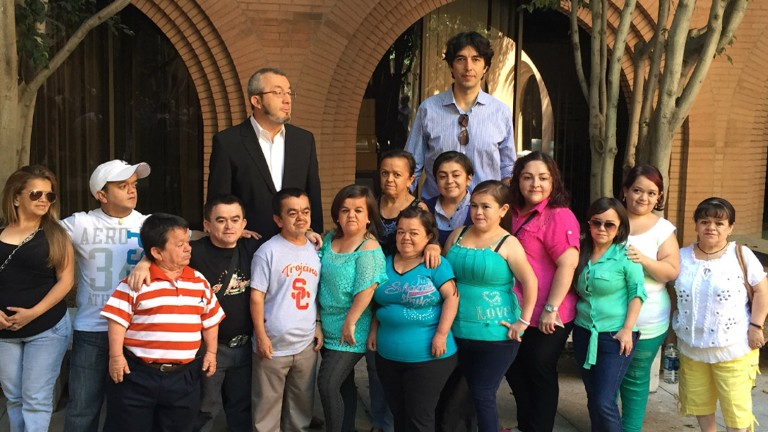
Could a rare mutation that causes dwarfism also slow ageing?

Bird flu in US cows: is the milk supply safe?

Future of Humanity Institute shuts: what's next for ‘deep future’ research?

Judge dismisses superconductivity physicist’s lawsuit against university
Nih pay raise for postdocs and phd students could have us ripple effect, hello puffins, goodbye belugas: changing arctic fjord hints at our climate future, china's moon atlas is the most detailed ever made, ‘shut up and calculate’: how einstein lost the battle to explain quantum reality, ecologists: don’t lose touch with the joy of fieldwork chris mantegna.

Should the Maldives be creating new land?

Lethal AI weapons are here: how can we control them?

Algorithm ranks peer reviewers by reputation — but critics warn of bias

How gliding marsupials got their ‘wings’
Bird flu virus has been spreading in us cows for months, rna reveals, audio long read: why loneliness is bad for your health, nato is boosting ai and climate research as scientific diplomacy remains on ice, rat neurons repair mouse brains — and restore sense of smell.

Retractions are part of science, but misconduct isn’t — lessons from a superconductivity lab

Any plan to make smoking obsolete is the right step

Citizenship privilege harms science
European ruling linking climate change to human rights could be a game changer — here’s how charlotte e. blattner, will ai accelerate or delay the race to net-zero emissions, current issue.

The Maldives is racing to create new land. Why are so many people concerned?
Surprise hybrid origins of a butterfly species, stripped-envelope supernova light curves argue for central engine activity, optical clocks at sea, research analysis.

Ancient DNA traces family lines and political shifts in the Avar empire
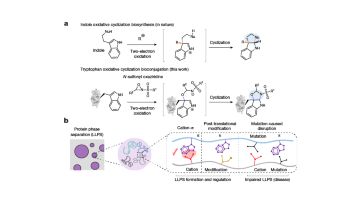
A chemical method for selective labelling of the key amino acid tryptophan
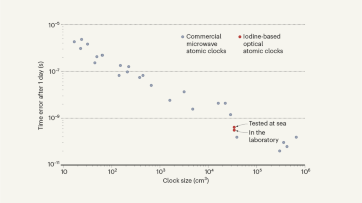
Robust optical clocks promise stable timing in a portable package

Targeting RNA opens therapeutic avenues for Timothy syndrome
Bioengineered ‘mini-colons’ shed light on cancer progression, galaxy found napping in the primordial universe, tumours form without genetic mutations, marsupial genomes reveal how a skin membrane for gliding evolved.

Scientists urged to collect royalties from the ‘magic money tree’

Breaking ice, and helicopter drops: winning photos of working scientists

Shrouded in secrecy: how science is harmed by the bullying and harassment rumour mill
Want to make a difference try working at an environmental non-profit organization, how ground glass might save crops from drought on a caribbean island, books & culture.

How volcanoes shaped our planet — and why we need to be ready for the next big eruption
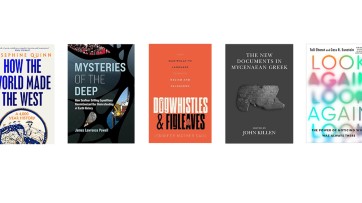
Dogwhistles, drilling and the roots of Western civilization: Books in brief

Cosmic rentals
Las borinqueñas remembers the forgotten puerto rican women who tested the first pill, dad always mows on summer saturday mornings, nature podcast.

Latest videos
Nature briefing.
An essential round-up of science news, opinion and analysis, delivered to your inbox every weekday.
Quick links
- Explore articles by subject
- Guide to authors
- Editorial policies
Six-Month-Old AI Coding Startup Valued at $2 Billion by Founders Fund
The promise of a chatbot that can write and fix code has attracted repeat investments in a six-month-old startup—even after it appeared to flub its product launch.
Founders Fund has led a $175 million investment in Cognition, a startup that recently launched an artificial intelligence–powered coding assistant called Devin, according to an investor who reviewed terms of the deal. The venture firm valued the startup at $2 billion, including the new money, the investor said. Just a month earlier, Founders Fund led the startup’s Series A investment at a $350 million valuation, according to PitchBook.
NASA’s Voyager 1 Resumes Sending Engineering Updates to Earth

NASA’s Voyager 1 spacecraft is depicted in this artist’s concept traveling through interstellar space, or the space between stars, which it entered in 2012.
After some inventive sleuthing, the mission team can — for the first time in five months — check the health and status of the most distant human-made object in existence.
For the first time since November , NASA’s Voyager 1 spacecraft is returning usable data about the health and status of its onboard engineering systems. The next step is to enable the spacecraft to begin returning science data again. The probe and its twin, Voyager 2, are the only spacecraft to ever fly in interstellar space (the space between stars).
Voyager 1 stopped sending readable science and engineering data back to Earth on Nov. 14, 2023, even though mission controllers could tell the spacecraft was still receiving their commands and otherwise operating normally. In March, the Voyager engineering team at NASA’s Jet Propulsion Laboratory in Southern California confirmed that the issue was tied to one of the spacecraft’s three onboard computers, called the flight data subsystem (FDS). The FDS is responsible for packaging the science and engineering data before it’s sent to Earth.
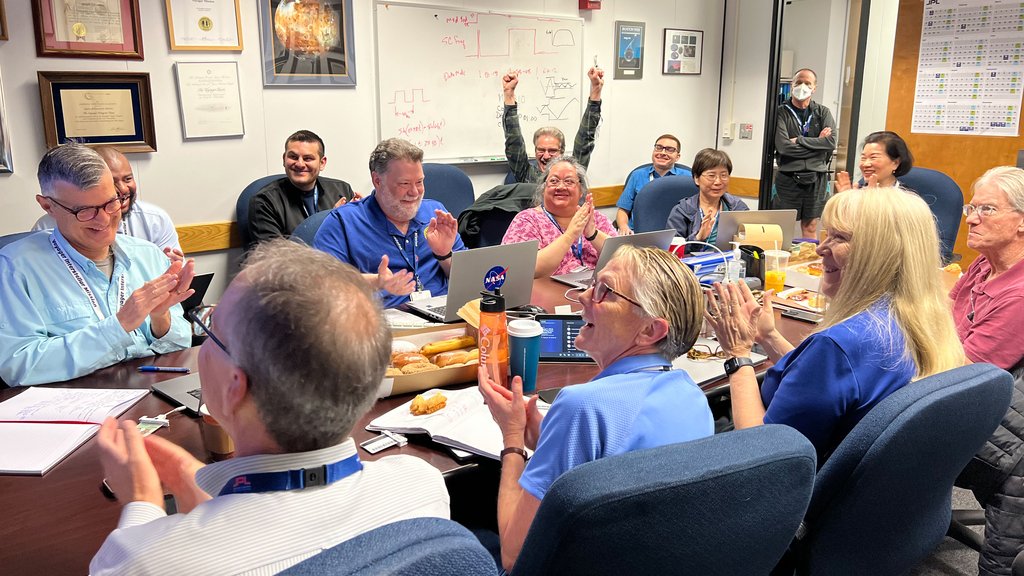
After receiving data about the health and status of Voyager 1 for the first time in five months, members of the Voyager flight team celebrate in a conference room at NASA’s Jet Propulsion Laboratory on April 20.
The team discovered that a single chip responsible for storing a portion of the FDS memory — including some of the FDS computer’s software code — isn’t working. The loss of that code rendered the science and engineering data unusable. Unable to repair the chip, the team decided to place the affected code elsewhere in the FDS memory. But no single location is large enough to hold the section of code in its entirety.
So they devised a plan to divide the affected code into sections and store those sections in different places in the FDS. To make this plan work, they also needed to adjust those code sections to ensure, for example, that they all still function as a whole. Any references to the location of that code in other parts of the FDS memory needed to be updated as well.
The team started by singling out the code responsible for packaging the spacecraft’s engineering data. They sent it to its new location in the FDS memory on April 18. A radio signal takes about 22 ½ hours to reach Voyager 1, which is over 15 billion miles (24 billion kilometers) from Earth, and another 22 ½ hours for a signal to come back to Earth. When the mission flight team heard back from the spacecraft on April 20, they saw that the modification worked: For the first time in five months, they have been able to check the health and status of the spacecraft.
Get the Latest News from the Final Frontier
During the coming weeks, the team will relocate and adjust the other affected portions of the FDS software. These include the portions that will start returning science data.
Voyager 2 continues to operate normally. Launched over 46 years ago , the twin Voyager spacecraft are the longest-running and most distant spacecraft in history. Before the start of their interstellar exploration, both probes flew by Saturn and Jupiter, and Voyager 2 flew by Uranus and Neptune.
Caltech in Pasadena, California, manages JPL for NASA.
News Media Contact
Calla Cofield
Jet Propulsion Laboratory, Pasadena, Calif.
626-808-2469
Fairfield University Hosts Second Annual Stay-A-Stag Event

Seniors gather to celebrate their enrollment into graduate programs at their soon-to-be alma mater.
It was a night to honor the end of one chapter and the beginning of another.
On Thursday, April 18, Fairfield University’s Graduate Admissions and Office of the Provost hosted a cocktail reception in Alumni House celebrating a very special group of seniors. These students, who will walk across the Commencement stage on May 19 to receive their undergraduate degrees, have made the important decision to continue their education at Fairfield to pursue graduate degrees.
About sixty students, along with faculty representatives from each of the academic schools and admissions support staff, enjoyed hors d’oeuvres, cocktails, and conversation in the relaxed and celebratory atmosphere. Melanie Rogers, director of the Office of Graduate Admission, opened the evening with a brief welcome and then introduced Vice Provost Walter Rankin, PhD.
“The decision to earn a master’s degree builds a strong foundation for your future success,” said Rogers. Fairfield’s graduate population is composed of a solid population of alumni who value the reputation of the programs and mission of the Jesuit institution.
Liana Giacobbe ’24, who will continue her studies in Marketing Analytics and Strategy, said that her decision to continue at Fairfield was strategic. “I want to have a leg up on the competition when I start my job search in Marketing, so the more I arm myself with information, the better.”
For other students, the decision to remain at Fairfield for a fifth year is one of practicality. Ashley McKenna ’24 explained that Fairfield’s 5-year accelerated program in accounting makes budgetary sense. The accelerated bachelor’s-to-master’s program allowed her to take two graduate-level courses during her undergraduate studies and will lead to earning her MSA in less time and at less cost than when acquired separately.
Dr. Rankin toasted the students’ success with an Irish poem rooted in Jesuit mission. “May you have warm words on a cold evening, a full moon on a dark night, and a smooth road all the way to your door.” The sentiment tied in nicely with Fairfield’s Jesuit mission to help its students find their true calling and vocation in the world.
For now, these students look to the possibilities laid out before them, confident that their Fairfield education is helping them feed their passion, explore their purpose, and reach their potential.
Once A Stag, Always A Stag!
Tags: Top Stories
Recent News
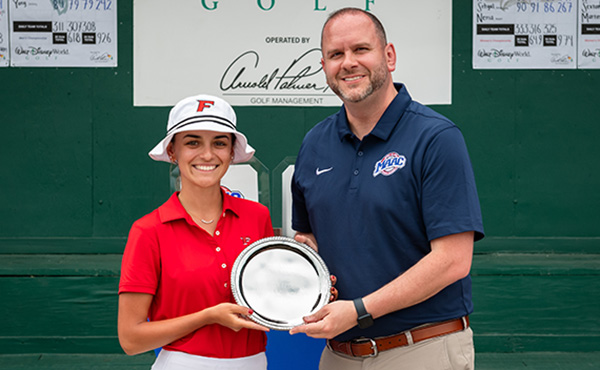
Maria Beltran Wins 2024 MAAC Championship, Will Compete at NCAA Regional
Read the Article

Fairfield Alumni Nationwide Stepped Up in Service During Jesuit Service Month

Fairfield University and Barnes and Noble College Launch Textbook Program, Red Stack Direct

Stags Tennis Win 2024 MAAC Championship
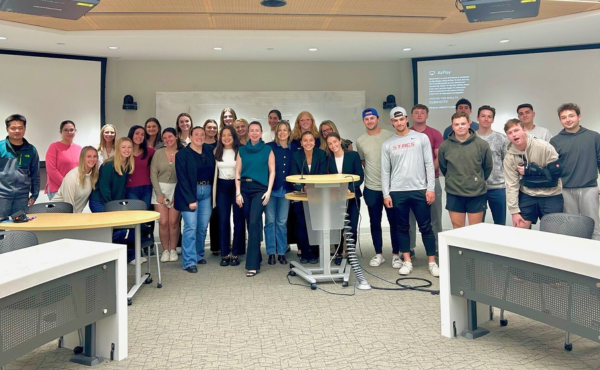
Fairfield Dolan Students Pitch Growth Ideas to Local Business, Here for You

Mahoney Arena Honored with Engineering Excellence Award
Search results.

IMAGES
VIDEO
COMMENTS
I procrastinated 3 months away and did 90% of the research and writing in about one month for my 40 page minimum master's thesis. You can see a flurry of activity on my github in the 1-1.5 weeks of writing. I'm now doing a PhD straight out of my master's. You'll be okay.
FIGURE 8. EndNote's Cite While You Write function. 2) Intermediate documents: the thesis/dissertation proposal and grant applications. Think of your thesis or dissertation proposal and any grant applications as being a big first step toward the first chapter of your final document: the introduction.
Instead of inserting "work on thesis" into your calendar, insert measurable goals like "finish Figure 1" or "write two pages of Chapter 2.". 7. Write In Very Short Bursts. Writing in several short bursts is more efficient than writing in a few, long extended periods of time. If you ever tried to write for several hours in a row, you ...
Table Of Contents. My 8 tips on how to write a thesis or dissertation in a month. 1. Adjust Your Expectations. 2. Don't Be a Perfectionist. 3. Take the 80/20 Rule Seriously. 3.1 Use Grammarly: An Online Writing Assistant.
Here is a proposal: make a document with your PhD plan. Write down in that document the important things that need to be done in the last six months of your PhD, preferably in some chronological order. 3 Examples of things to write can be submission of papers, finishing data analyses or other leftover work, writing the thesis, preparing for the ...
8) Get feedback on the whole thesis. "We often get feedback on individual chapters but plan to get feedback from your supervisor on the PhD as a whole to make sure it all hangs together nicely ...
A PhD thesis is a work of original research all students are requiured to submit in order to succesfully complete their PhD. The thesis details the research that you carried out during the course of your doctoral degree and highlights the outcomes and conclusions reached. The PhD thesis is the most important part of a doctoral research degree ...
Writing up a PhD can often take place in a frenzy of activity in the last few months of your degree study, after years of hard work. But there are some steps that you can take to increase your chances of success. ... One of the most common errors in academic writing is to cite papers in the text that do not then appear in the bibliography. All ...
A PhD thesis (or dissertation) is typically 60,000 to 120,000 words ( 100 to 300 pages in length) organised into chapters, divisions and subdivisions (with roughly 10,000 words per chapter) - from introduction (with clear aims and objectives) to conclusion. The structure of a dissertation will vary depending on discipline (humanities, social ...
Last month, we offered suggestions on how to prepare for your thesis defence: Decide whether you need more research results, sketch out a plan for those experiments and for writing thesis chapters, and--importantly--get your supervisor's support for that plan.Now it's time to wrap things up in the lab and start writing. Writing a thesis is easier said than done, of course, and you have plenty ...
Maintain consistency in your writing style: One of the most useful writing tips for PhD students is referring to the preferred style guide to ensure consistency in spellings, proper punctuation, correct hyphenation, and the right use of technical terms and phrases. Also check for consistency when it comes mentioning organizations and ...
Gather data and information for your study. Analyze your data. Write, write, and write some more. Ideally, aim to write for a minimum of 30 minutes a day. Defend your thesis. Finish. Completing your PhD paper on time is definitely possible. Knowing the tips and tricks of the trade can help you to get on your way towards a life in academia.
Here are 8 major milestones of a PhD program: Milestone 1: Through consultation with your advisor, check whether there are any special graduation requirements other than the university and department that you may have to complete as part of your program. Milestone 2: The supervisory committee must be formed within one year of the doctoral ...
Table of contents. How to Write a Research Paper in a Month: A Step-by-Step Guide with Timeline. Step 1: Choose an Engaging Topic (Days 1-2): Step 2: Perform In-Depth Research (Days 3-8): Step 3: Develop a Solid Thesis Statement (Day 9): Step 4: Create an Outline (Days 10-11): Step 5: Write the First Draft (Days 12-23):
Students have to write a dissertation during their Ph.D. course. But many realize its importance and complexity only when there is little time left and are u...
Skim them to identify which of the elements in the Introduction model on page 9 are present in each one. Label the main parts B (Background to the Research), RES (the Research), and REP (the Report). Then see which of the more detailed labels (e.g. identifying a research 'gap' or aims) you can apply.
4. Get a Decent Computer. All my life i've used the cheapest computer I could get. As an undergraduate I didn't have a computer until my final year. That had been slightly upgraded during the ...
7. Targets and consistency. I set myself a target of 3 months, broken down into targets for each chapter. This would give me about 3 months in reserve before the final absolute deadline. I had a daily minimum target of 500 words, which I knew I could meet even on the least productive days.
I would write for about 2-4 hours each day, take a break for lunch, to run errands, do chores, etc. Then after dinner, I'd go back and reread/edit what I had written. That usually took about an hour. This whole routine was repeated almost every day, allowing me to produce about 10-15 pages/day. Took me about 2.5 months to finish the writing.
Here are two ways that I managed to do it. Write. Even when you have zero motivation. This applies especially to those who are in the situation I was in. Since the aim is to fill your content ...
That's what I did in my first month as a PhD student. It's been a hectic and stressful, and simultaneously exciting & fulfilling month. It's everything I dreamed of and more, and I count myself as lucky since I get to do something so fun. I will update this blog on what I get up to in November in a month's time.
The PhD Discussion Chapter: What It Is & How To Write It. Sep 11, 2023. Your PhD discussion chapter is your thesis's intellectual epicenter. Think of it as the scholarly equivalent of a courtroom closing argument, where you summarise the evidence and make your case. Perhaps that's why it's so tricky - the skills you need in your ...
Ph.D. in Creative Writing. A rigorous program that combines creative writing and literary studies, the Ph.D. in Creative Writing prepares graduates for both scholarly and creative publication and teaching. With faculty guidance, students admitted to the Ph.D. program may tailor their programs to their goals and interests.
Hana Taylor Schlitz (L & R) is set to become the youngest graduate in the history of Texas Woman's University, in May 2024. According to the World Health Organization, TB is one of the top 10 ...
Find breaking science news and analysis from the world's leading research journal.
The promise of a chatbot that can write and fix code has attracted repeat investments in a six-month-old startup—even after it appeared to flub its product launch.. Founders Fund has led a $175 million investment in Cognition, a startup that recently launched an artificial intelligence-powered coding assistant called Devin, according to an investor who reviewed terms of the deal.
For the first time since November, NASA's Voyager 1 spacecraft is returning usable data about the health and status of its onboard engineering systems.The next step is to enable the spacecraft to begin returning science data again. The probe and its twin, Voyager 2, are the only spacecraft to ever fly in interstellar space (the space between stars).
Pro: Supports 2 users and runs $19/month with unlimited support; Plus: Supports up to 3 users and runs $29/month with unlimited support; Team: Supports up to 7 users and runs $69/month with ...
It was a night to honor the end of one chapter and the beginning of another. On Thursday, April 18, Fairfield University's Graduate Admissions and Office of the Provost hosted a cocktail reception in Alumni House celebrating a very special group of seniors.